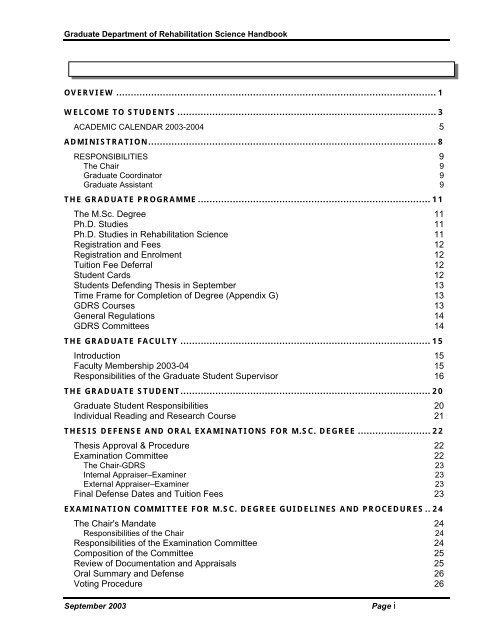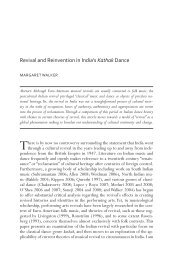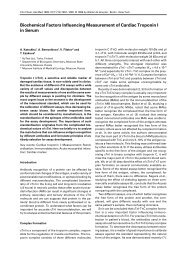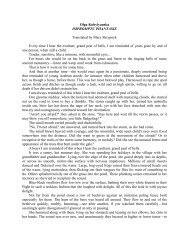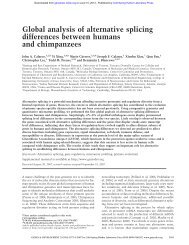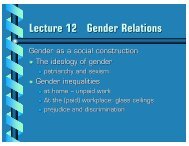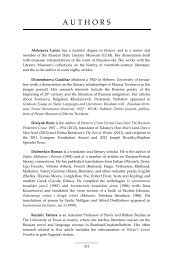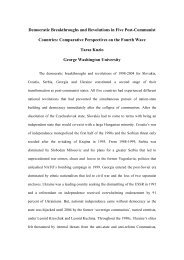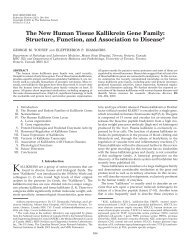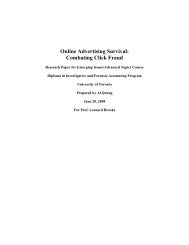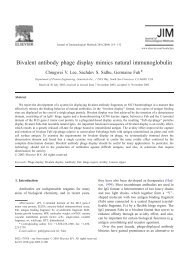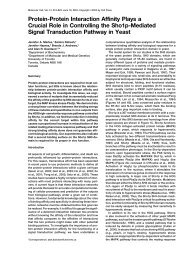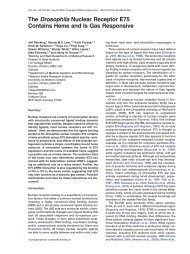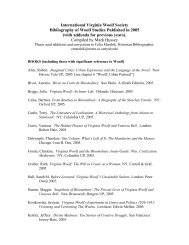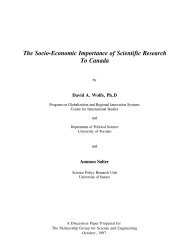graduate students - University of Toronto
graduate students - University of Toronto
graduate students - University of Toronto
Create successful ePaper yourself
Turn your PDF publications into a flip-book with our unique Google optimized e-Paper software.
Graduate Department <strong>of</strong> Rehabilitation Science Handbook<br />
Table <strong>of</strong> Contents<br />
OVERVIEW .............................................................................................................. 1<br />
WELCOME TO STUDENTS ......................................................................................... 3<br />
ACADEMIC CALENDAR 2003-2004 5<br />
ADMINISTRATION................................................................................................... 8<br />
RESPONSIBILITIES 9<br />
The Chair 9<br />
Graduate Coordinator 9<br />
Graduate Assistant 9<br />
THE GRADUATE PROGRAMME ................................................................................ 11<br />
The M.Sc. Degree 11<br />
Ph.D. Studies 11<br />
Ph.D. Studies in Rehabilitation Science 11<br />
Registration and Fees 12<br />
Registration and Enrolment 12<br />
Tuition Fee Deferral 12<br />
Student Cards 12<br />
Students Defending Thesis in September 13<br />
Time Frame for Completion <strong>of</strong> Degree (Appendix G) 13<br />
GDRS Courses 13<br />
General Regulations 14<br />
GDRS Committees 14<br />
THE GRADUATE FACULTY ...................................................................................... 15<br />
Introduction 15<br />
Faculty Membership 2003-04 15<br />
Responsibilities <strong>of</strong> the Graduate Student Supervisor 16<br />
THE GRADUATE STUDENT...................................................................................... 20<br />
Graduate Student Responsibilities 20<br />
Individual Reading and Research Course 21<br />
THESIS DEFENSE AND ORAL EXAMINATIONS FOR M.SC. DEGREE ......................... 22<br />
Thesis Approval & Procedure 22<br />
Examination Committee 22<br />
The Chair-GDRS 23<br />
Internal Appraiser–Examiner 23<br />
External Appraiser–Examiner 23<br />
Final Defense Dates and Tuition Fees 23<br />
EXAMINATION COMMITTEE FOR M.SC. DEGREE GUIDELINES AND PROCEDURES .. 24<br />
The Chair's Mandate<br />
Responsibilities <strong>of</strong> the Chair<br />
24<br />
24<br />
Responsibilities <strong>of</strong> the Examination Committee 24<br />
Composition <strong>of</strong> the Committee 25<br />
Review <strong>of</strong> Documentation and Appraisals 25<br />
Oral Summary and Defense 26<br />
Voting Procedure 26<br />
September 2003<br />
Page i
Graduate Department <strong>of</strong> Rehabilitation Science Handbook<br />
RESEARCH IN THE GDRS ....................................................................................... 30<br />
Faculty <strong>of</strong> Medicine Guidelines on Ethical Conduct <strong>of</strong> Research and Conflict <strong>of</strong> Interest 30<br />
Ethics Approval Policies 30<br />
Ethics Review Contacts at Affiliated Hospitals 31<br />
COLLABORATIVE PROGRAMS ................................................................................ 34<br />
Neurosciences 34<br />
Human Development, Life Course and Aging 35<br />
Cardiovascular Sciences Collaborative Program 35<br />
Institute <strong>of</strong> Biomaterials and Biomedical Engineering 36<br />
Health Services and Policy Research 36<br />
GDRS EVENTS, PUBLICATIONS AND COMMUNICATIONS ....................................... 38<br />
Publications 38<br />
Departmental Website 38<br />
Bulletin Boards 38<br />
Rehab News 38<br />
FUNDING POLICY 2003/2004 ............................................................................... 40<br />
Inroduction 40<br />
Statement <strong>of</strong> Agreement 40<br />
AWARDS 41<br />
External Awards 41<br />
Internal Awards 42<br />
GRADUATE STUDENTS’ ASSOCIATION................................................................... 44<br />
2003-2004 Student Representatives: 44<br />
GENERAL STUDENT INFORMATION ....................................................................... 46<br />
Student Lounge 46<br />
Student Counseling 46<br />
Computer Room 46<br />
Student Leave <strong>of</strong> Absence 47<br />
Health Services 48<br />
Health Insurance for International Students and Families 48<br />
International Student Center (ISC) 48<br />
Accommodation 48<br />
Graduate House Residence 49<br />
On-Campus Housing 49<br />
<strong>University</strong> Family Housing 50<br />
Off-Campus Housing 50<br />
LIST OF APPENDICES ............................................................................................ 52<br />
GLOSSARY............................................................................................................. 53<br />
September 2003<br />
Page ii
Graduate Department <strong>of</strong> Rehabilitation Science Handbook<br />
OVERVIEW<br />
The Graduate Department <strong>of</strong> Rehabilitation Science (GDRS) www.utoronto.ca/gdrs, within the School<br />
<strong>of</strong> Graduate Studies (SGS) http://www.sgs.utoronto.ca/index.asp, is the <strong>graduate</strong> unit for training<br />
doctoral stream <strong>students</strong> in the Departments <strong>of</strong> Physical Therapy and Occupational Therapy. It was<br />
established in 1995 to foster <strong>graduate</strong> education and scholarship in Rehabilitation Science.<br />
The academic activities <strong>of</strong> its <strong>students</strong> cover a full breadth <strong>of</strong> rehabilitation science, reflecting the<br />
heterogeneity <strong>of</strong> the field. Faculty from the Departments <strong>of</strong> Physical Therapy, Occupational Therapy,<br />
and other faculty Departments in the Faculty <strong>of</strong> Medicine comprise the faculty <strong>of</strong> GDRS. The GDRS is<br />
part <strong>of</strong> the collaborative programs in Neurosciences, Cardiovascular Sciences, Human Development,<br />
Life Course and Aging, Health Services and Policy Research and Institute <strong>of</strong> Biomaterials and<br />
Biomedical Engineering and currently has 42 faculty members and 55 <strong>graduate</strong> <strong>students</strong>.<br />
The Graduate Department <strong>of</strong> Rehabilitation Science is located administratively at 500 <strong>University</strong> Ave.<br />
10th floor, in the Rehabilitation Sciences Building, Centre for Function and Well-Being. The <strong>students</strong><br />
and faculty are also distributed throughout the <strong>University</strong> <strong>of</strong> <strong>Toronto</strong>, Academic Health Sciences<br />
Complex, including teaching hospitals and research institutes.<br />
This Handbook has been designed to provide essential information for both new and continuing<br />
GDRS <strong>students</strong> and faculty.<br />
September 2003 Page 1
Graduate Department <strong>of</strong> Rehabilitation Science Handbook<br />
September 2003 Page 2
Graduate Department <strong>of</strong> Rehabilitation Science Handbook<br />
WELCOME TO STUDENTS<br />
On behalf <strong>of</strong> the faculty and staff <strong>of</strong> the Graduate Department <strong>of</strong> Rehabilitation Science, may I extend<br />
a warm welcome to you, whether enrolling for the first time, or continuing your program. The GDRS<br />
provides <strong>graduate</strong> training for <strong>students</strong> with academic and pr<strong>of</strong>essional backgrounds in rehabilitation<br />
and other health related fields. Graduate <strong>students</strong> will engage in research with the common theme <strong>of</strong><br />
rehabilitation science. Students will <strong>graduate</strong> with a Master <strong>of</strong> Science (M.Sc.) degree from the<br />
<strong>University</strong> <strong>of</strong> <strong>Toronto</strong>, School <strong>of</strong> Graduate Studies—Division IV, Life Sciences.<br />
This Handbook has been designed to provide an overview <strong>of</strong> information important for <strong>students</strong> and<br />
faculty. I would appreciate your comments and suggestions about the content. The year 2004 will be<br />
an exciting year for the Graduate Department <strong>of</strong> Rehabilitation Science as we anticipate launching<br />
our PhD Program. Please visit our website for updates on this new initiative.<br />
I hope this year will be productive and enjoyable for you. I look forward to meeting each <strong>of</strong> you<br />
individually and hearing about your academic program.<br />
Molly Verrier<br />
Chair, Graduate Department <strong>of</strong> Rehabilitation Science<br />
September 2003 Page 3
Graduate Department <strong>of</strong> Rehabilitation Science Handbook<br />
September 2003 Page 4
Graduate Department <strong>of</strong> Rehabilitation Science Handbook<br />
ACADEMIC CALENDAR 2003-2004<br />
2003<br />
M August 4 Civic Holiday<br />
T August 5 Registration for September session begins<br />
S August 31 Recommended date for payment <strong>of</strong> tuition fees<br />
M September 1 Labour Day<br />
M September 8 Most formal <strong>graduate</strong> courses and seminars begin in the week <strong>of</strong><br />
September 9<br />
F September 12 Registration for September session ends; after this date, a late registration<br />
fee will be assessed<br />
M September 15 Final date to submit Ph.D. theses to avoid fee charges<br />
F September 19 Grades due for summer session courses and extended courses<br />
W September 24 Summer Session grades available for viewing by <strong>students</strong> on the Student<br />
Web Service<br />
F October 3 Final date for receipt <strong>of</strong> degree recommendations and submission <strong>of</strong> any<br />
required theses for master’s degrees for Fall Convocation<br />
F October 3 Final date to submit final Ph.D. thesis for Fall Convocation<br />
F October 3 Final date to add full-year and September session courses<br />
M October 13 Thanksgiving<br />
F October 31 Final date to drop September session full or half-courses without<br />
academic penalty<br />
M November TBA Fall Convocation<br />
T November TBA Fall Convocation<br />
December<br />
For last day <strong>of</strong> classes before Winter break, consult <strong>graduate</strong> units<br />
concerned<br />
September 2003 Page 5
Graduate Department <strong>of</strong> Rehabilitation Science Handbook<br />
2004<br />
January<br />
For first day <strong>of</strong> classes in the New Year, consult <strong>graduate</strong> units concerned<br />
F January 9 Final date for registration <strong>of</strong> <strong>students</strong> beginning program in January<br />
session; after this date, a late registration fee will be assessed<br />
Th January 15 Final date to submit Ph.D. theses without fee payment for January session<br />
F January 16 Grades due for September session courses<br />
W January 21 Final date to add January session only courses<br />
F January 23 Final date for receipt <strong>of</strong> degree recommendations and submission <strong>of</strong> any<br />
required theses for March or June graduation for master’s <strong>students</strong><br />
without fees being charged for the January session<br />
F January 30 Final date for all <strong>students</strong> to request that their degrees be conferred in<br />
absentia in March<br />
F January 30 September dual registrants must be recommended for the master’s<br />
degree by this date to maintain their Ph.D. registration<br />
[Faculty <strong>of</strong> Arts and Science Reading Week = February 17-21]<br />
F February 27 Final date to drop full-year or January session courses without academic<br />
penalty<br />
March TBA March Graduation in absentia<br />
F April 9 Good Friday<br />
F April 23 For <strong>students</strong> obtaining degrees at June Convocation, course work must be<br />
completed and grades submitted for full-year and January session<br />
courses<br />
F April 23 Final date for receipt <strong>of</strong> degree recommendations and submission <strong>of</strong> any<br />
required theses for master’s degrees for June Convocation<br />
F April 23 Final date for submission <strong>of</strong> final Ph.D. thesis for <strong>students</strong> whose degrees<br />
are to be conferred at the June Convocation<br />
F April 23 Final date for degree recommendations <strong>of</strong> January dual registrants for the<br />
master’s degree to maintain their Ph.D. registration<br />
September 2003 Page 6
Graduate Department <strong>of</strong> Rehabilitation Science Handbook<br />
F May 7 Final date for registration for May session<br />
F May 14 Course work must be completed and grades submitted for full-year and<br />
January session courses (except for extended courses)<br />
F May 14 Final date to enroll in May-June or May-August session courses<br />
W May 19 January Session grades available for viewing by <strong>students</strong> on the Student<br />
Web Service<br />
M May 24 Victoria Day<br />
June TBA Spring Convocation<br />
June TBA Spring Convocation<br />
F June 6 Final date to drop May/June F section courses without academic penalty<br />
M July 1 Canada Day<br />
F July 4 Final date for registration for July-August courses<br />
F July 4 Final date to drop May-August session Y section courses without<br />
academic penalty<br />
F July 25 Final date to drop July-August S section courses without academic penalty<br />
F July 25 Grades due for May/June F Section Courses<br />
September 2003 Page 7
Graduate Department <strong>of</strong> Rehabilitation Science Handbook<br />
Administration<br />
The <strong>of</strong>fice <strong>of</strong> the GDRS is located 500 <strong>University</strong> Ave., 10th floor room 1026 in the Rehabilitation<br />
Sciences Building, Centre for Function and Well-Being. Student study space and a lounge area are<br />
also housed at this address. The <strong>of</strong>fice address is:<br />
Graduate Department <strong>of</strong> Rehabilitation Science<br />
Rehabilitation Sciences Building,<br />
Centre for Function and Well-Being<br />
<strong>University</strong> <strong>of</strong> <strong>Toronto</strong><br />
500 <strong>University</strong> Avenue, Room 1016<br />
<strong>Toronto</strong>, Ontario, M5T 1W5<br />
Tel: (416) 978-0300<br />
Fax: (416) 946-8762<br />
e-mail: rehab.science@utoronto.ca<br />
web site: http://www.utoronto.ca/gdrs<br />
Chair Pr<strong>of</strong>essor Molly Verrier (416) 978-5935<br />
Graduate Coordinator Dr. Denise Reid (416) 978-5937<br />
Graduate Assistant J. Diane Wiltshire (416) 978-0300<br />
September 2003 Page 8
Graduate Department <strong>of</strong> Rehabilitation Science Handbook<br />
RESPONSIBILITIES<br />
The Chair<br />
The Chair is appointed, according to the Haist Rules, by the Dean <strong>of</strong> the School <strong>of</strong> Graduate Studies<br />
(SGS) and reports in all academic matters to the Dean <strong>of</strong> the SGS. Budgetarily, the Chair reports to<br />
the Faculty <strong>of</strong> Medicine. The Chair is ultimately responsible for all academic and administrative<br />
aspects <strong>of</strong> the GDRS (including faculty and <strong>students</strong>), in accordance with the <strong>University</strong> <strong>of</strong> <strong>Toronto</strong><br />
policies and procedures. The Chair is assisted by the Graduate Administrative Coordinator, who has<br />
special designated responsibilities.<br />
Duties <strong>of</strong> the Chair include:<br />
! approval <strong>of</strong> faculty membership on <strong>graduate</strong> program committees, thesis defense committees<br />
! organization <strong>of</strong> Ph.D. transfer<br />
! administration <strong>of</strong> SGS and GDRS policies and procedures concerning <strong>graduate</strong> studies<br />
! development <strong>of</strong> the academic program in rehabilitation science<br />
Graduate Coordinator<br />
The GDRS Coordinator is responsible for the <strong>graduate</strong> program activities for all <strong>students</strong> in the<br />
Department. Accordingly, the GDRS Coordinator sits on the Graduate Coordinators Committee <strong>of</strong> the<br />
Faculty <strong>of</strong> Medicine and Division IV Life Sciences Executive, School <strong>of</strong> Graduate Studies.<br />
Duties <strong>of</strong> the Coordinator include:<br />
! administration <strong>of</strong> <strong>graduate</strong> application, admission and enrollment procedures<br />
! organization <strong>of</strong> faculty to chair M.Sc. defense committees<br />
! nomination <strong>of</strong> <strong>students</strong> for internal and external awards<br />
! maintenance <strong>of</strong> current student award status and advice to <strong>students</strong> <strong>of</strong> funding opportunities<br />
Graduate Assistant<br />
The Graduate Assistant assists in the Graduate Program, faculty appointments, and day-to-day<br />
running <strong>of</strong> the Graduate Department.<br />
September 2003 Page 9
Graduate Department <strong>of</strong> Rehabilitation Science Handbook<br />
September 2003 Page 10
Graduate Department <strong>of</strong> Rehabilitation Science Handbook<br />
THE GRADUATE PROGRAMME<br />
The M.Sc. Degree<br />
The program includes both course work and a thesis. Minimum requirements include the course<br />
REH1100H (Theory and Research in Rehabilitation Science), REH2001Y (Rehabilitation<br />
Presentations and Proceedings), one half course in Research Methodology and Statistics, and one<br />
additional half course, at a <strong>graduate</strong> level, related to the field <strong>of</strong> study. Candidates must submit a<br />
thesis on their research and be examined by the Thesis Committee.<br />
As a general policy, the GDRS encourages <strong>students</strong> to spend the maximum time in their research.<br />
Courses, however, can be invaluable in helping the student acquire the content, knowledge, and<br />
expertise for her/his chosen research field or discipline. It is expected that <strong>students</strong> will acquire a firm<br />
grasp <strong>of</strong> the fundamentals. Such a foundation is an absolute prerequisite for later success as<br />
independent researchers. Therefore, in selecting suitable courses, the supervisor and student should<br />
be guided not only by what is the expected standard, but also by opportunities to fill in gaps <strong>of</strong><br />
knowledge.<br />
M.Sc. Program—the expected duration <strong>of</strong> the M.Sc. program is about 18 to 24 months for full<br />
time <strong>students</strong>, including time for thesis preparation and defense. Engagement in research<br />
should be initiated as soon as possible and well underway within six months <strong>of</strong> enrollment.<br />
The specific guidelines outlining the responsibilities <strong>of</strong> the supervisor and the student for organization<br />
<strong>of</strong> the M.Sc. defense are provided in Appendix A.<br />
Part-time <strong>students</strong> must agree to an Annual Learning Contract (Appendix B) and must submit a Basic<br />
Program Information Sheet (Appendix C), planned with her/his supervisor, to the GDRS. Part-time<br />
<strong>students</strong> should be aware that it is the student’s responsibility to modify her/his schedule to<br />
accommodate required course work, as course times are not flexible.<br />
Each student must (i) submit a thesis on her/his research, and (ii) pass an oral thesis examination. It<br />
is strongly recommended that <strong>students</strong> prepare a paper for submission to a peer reviewed journal. A<br />
Master’s thesis is generally considered to be the equivalent <strong>of</strong> one full peer-reviewed research paper,<br />
with a thorough, integrated literature review and a detailed description <strong>of</strong> methods greater than<br />
allowed in publication. The form, Report on M.Sc. Thesis Defense, must be completed by the<br />
supervisor and signed by members attending the thesis defense (see Appendix D).<br />
N.B.: The supervisor and student share responsibility to contact and ensure the participation<br />
<strong>of</strong> all examiners and to provide the requested information to the GDRS at least four weeks in<br />
advance <strong>of</strong> the defense.<br />
Ph.D. Studies<br />
M.Sc. <strong>students</strong> who display a high level <strong>of</strong> scholarly achievement and research productivity may be<br />
recommended by their supervisor and PAC for a Ph.D. program. This process must be initiated<br />
within 18 months from the time <strong>of</strong> initial enrollment and requires a written recommendation from the<br />
supervisor and PAC members. Course work for the M.Sc., must be completed with an average <strong>of</strong> A-<br />
or higher (all courses), and approval <strong>of</strong> a written Ph.D. proposal. Evidence <strong>of</strong> productivity, such as<br />
presentations and published abstracts and manuscripts (including submitted) is essential. Students<br />
must first transfer to the IMS program at the M.Sc. level (with a formal application). The IMS will<br />
determine whether the recommendation is acceptable and if yes, then the student may take the<br />
transfer examination within the IMS (see Appendix E).<br />
Ph.D. Studies in Rehabilitation Science<br />
It is anticipated that the Ph.D. program in Rehabilitation Science will start in 2004. Procedures to<br />
enroll in this program will be posted on a separate section <strong>of</strong> the website as they become available<br />
www.utoronto.ca/gdrs.<br />
September 2003 Page 11
Graduate Department <strong>of</strong> Rehabilitation Science Handbook<br />
Registration and Fees<br />
Graduate <strong>students</strong> in the Graduate Department <strong>of</strong> Rehabilitation Science are enrolled in Division IV<br />
(Life Sciences) <strong>of</strong> the School <strong>of</strong> Graduate Studies. The Associate Dean <strong>of</strong> Division IV is Dr. Umberto<br />
DeBoni.<br />
In August all <strong>students</strong> will receive a fees invoice. New <strong>students</strong> will also receive Fee Information, and<br />
a Fee Schedule. The School <strong>of</strong> Graduate Studies recommends payment <strong>of</strong> fees by August 31st so<br />
that payment is processed by September 12th, which is the deadline to register.<br />
If you plan to defer your fees on the basis <strong>of</strong> an award or OSAP, contact the GDRS <strong>of</strong>fice before<br />
August 29 to make deferral arrangements.<br />
Tuition Fees are paid at a financial institution by the due date for you to be registered. A student is<br />
considered to be registered as soon as he or she has paid tuition and incidental fees, or has made<br />
appropriate arrangements for deferral <strong>of</strong> payment. You may pay either the invoice total or the<br />
'Minimum Payment to Register' amount printed on your invoice.<br />
Information on Fees can be found at http://www.fees.utoronto.ca/<br />
Registration and Enrolment<br />
The <strong>University</strong> <strong>of</strong> <strong>Toronto</strong> student record system is ROSI (Repository Of Student Information).<br />
Students can view their integrated academic history and account information as well as order<br />
transcripts, change their address, phone numbers and e-mail addresses via the web at<br />
http://www.rosi.utoronto.ca/<br />
Completion <strong>of</strong> Fall/Winter Registration Enrolment covers the Fall, Winter and Summer sessions,<br />
therefore <strong>students</strong> are not required to complete *Summer Registration.<br />
Tuition Fee Deferral<br />
Students can defer fees at departments if they are award recipients <strong>of</strong> an internal award (<strong>University</strong> <strong>of</strong><br />
<strong>Toronto</strong> Fellowships, OGS, OGSST, NSERC, SSHRC, CIHR, Connaught, and Mary Beatty) which<br />
covers at least the minimum tuition fee (See Appendix F).<br />
The request for tuition fee deferral is conditional on the following:<br />
• that the first installment <strong>of</strong> your award covers the minimum first payment indicated on your Fees<br />
Invoice<br />
• that all severe admission conditions have been met<br />
• that your account does not have an outstanding balance from a previous session <strong>of</strong> over<br />
$100.00.<br />
Student Cards<br />
The photo ID serves as a student card, library card and. The photo-ID card can be obtained from<br />
Robarts Library, Gerstein Science Information Centre. This card provides access to 500 <strong>University</strong><br />
Avenue.<br />
*Please note <strong>students</strong> who enter the program in January are required to complete Summer Registration.<br />
September 2003 Page 12
Graduate Department <strong>of</strong> Rehabilitation Science Handbook<br />
Students Defending Thesis in September<br />
If you successfully defend your thesis, completing all modifications etc. by October 3rd you do not<br />
need to pay fees in September. If you are planning to defend after October 3rd but before January<br />
30th you must pay one term fee.<br />
Time Frame for Completion <strong>of</strong> Degree (Appendix G)<br />
At (or before) approximately 18 months, the supervisor and (Program Advisory Committee) PAC must<br />
meet to decide whether the student should complete a M.Sc., or be recommended for transfer to<br />
Ph.D. If the intention is to write the Master’s thesis, a proposed schedule for completion should be<br />
determined. If it is decided by the student, supervisor and committee that Ph.D. transfer is<br />
preferential, then consultation with the Chair <strong>of</strong> GDRS should be organized immediately.<br />
Part-time <strong>students</strong> must complete the program within five years; however, all course work must be<br />
completed within the first two years <strong>of</strong> the program. Part-time <strong>students</strong> should be aware that it is the<br />
student’s responsibility to modify her/his schedule to accommodate required course work, as course<br />
times are not flexible.<br />
Engagement in research and the first PAC meeting should be initiated as soon as possible<br />
and be well underway within six months <strong>of</strong> enrollment. A second meeting should be held near<br />
the end <strong>of</strong> the first year to review the student’s progress. Course work is usually completed by this<br />
time. PAC meetings should continue to take place at six-month intervals, to assess progress and<br />
provide direction. By 18 months, a plan should be in place for completion <strong>of</strong> the degree. The thesis<br />
must be in its final form and approved by the PAC before the GDRS defense can be arranged. The<br />
PAC will complete the relevant form at each meeting (see Appendix H). Students who are<br />
are considered by their PAC committee not to be doing well, may be terminated prior to the time<br />
allotted for degree completion.<br />
GDRS Courses<br />
The <strong>graduate</strong> courses <strong>of</strong>fered are listed below. Course Directors are identified after each course title.<br />
Detailed course descriptions and schedules for the courses <strong>of</strong>fered in a current year may be obtained<br />
from the Administrative Assistant <strong>of</strong> the GDRS. Courses may not be <strong>of</strong>fered every year and course<br />
<strong>of</strong>ferings are subject to change.<br />
REH 1100H Theory and Research in Rehabilitation Science M. Verrier, B Kirsh<br />
REH 1110H Rehabilitation Services Research and Policy S. Rappolt<br />
REH 1120H Research Methods in Rehabilitation S. Jaglal<br />
REH 1510H Disordered and Restorative Motor Control W. E. McIlroy, M. Verrier<br />
REH 1520H Physiological Factors Constraining Rehabilitation in the S. Thomas<br />
Elderly<br />
REH 1540H Rehabilitation Technology D. Reid, M., S. Naumann<br />
REH 1610H Environmental Theory in Rehabilitation K. Boschen<br />
REH 1620H Methodological Issues in Research on Aging and A. Colantonio, C. Cott<br />
Health<br />
REH 1630H Psychosocial Adaptation and Quality <strong>of</strong> Life Issues R. Renwick, J. Friedland<br />
REH 1640H Sociology <strong>of</strong> Disability K. Yoshida<br />
REH 2000H* Individual Reading and Research Course D. Brooks-Course Coordinator<br />
REH 2001H Rehabilitation Research Presentations K. Boschen<br />
RST 9999Y Research/Thesis<br />
See Appendix I for course descriptions.<br />
September 2003 Page 13
Graduate Department <strong>of</strong> Rehabilitation Science Handbook<br />
General Regulations<br />
Students who have reached the time limit allowed for their degree program, but not completed their<br />
degree requirements, may be considered for, at most, two one-year extensions. Extensions are<br />
requested by the GDRS and approved by the appropriate Graduate School Degree Committee. If an<br />
extension request is not approved or the GDRS does not recommend an extension, the student’s<br />
residency lapses. After an interval the GDRS may recommend a candidate’s reinstatement under the<br />
appropriate circumstances.<br />
Frequently, <strong>students</strong>, while on extensions, have their oral examinations scheduled for a date after the<br />
expiry <strong>of</strong> the extension. In these cases, granting an extension until the date <strong>of</strong> the oral is automatic,<br />
as long as the final oral examination is booked prior to the end <strong>of</strong> the extension period and the date <strong>of</strong><br />
the examination is no later than four months after the end <strong>of</strong> the extension. If the examination is<br />
cancelled, an extension request is necessary.<br />
GDRS Committees<br />
There are two standing committees within the GDRS. Committee memberships and detailed terms <strong>of</strong><br />
reference are available from the Administrative Assistant (978-0300).<br />
The Graduate Affairs and Appointments Committee (GAAF) is chaired by the Chair <strong>of</strong> the GDRS<br />
and advises the Chair on all aspects <strong>of</strong> GDRS administration. The GAAF is responsible for<br />
department program planning, policies and procedures, and appointments for the GDRS. The<br />
Committee defines the internal policies that govern the GDRS and makes final recommendations for<br />
faculty appointments to the SGS. It reviews and processes all applications for <strong>graduate</strong> faculty<br />
appointments and re-appointments. It regularly reviews and monitors all course <strong>of</strong>ferings by the<br />
GDRS and recommends and implements changes to the curriculum.<br />
The Graduate Admissions and Awards Committee (GAAD) is chaired by the Graduate<br />
Coordinator. The GAAD is responsible for student recruitment, admissions, awards and bursaries. It<br />
advises and assists the Coordinator on GDRS student admission policies, review <strong>of</strong> applications and<br />
recommendations for admission, and student internal funding competitions.<br />
September 2003 Page 14
Graduate Department <strong>of</strong> Rehabilitation Science Handbook<br />
THE GRADUATE FACULTY<br />
Introduction<br />
It is important to note that by accepting an appointment to the GDRS (and the SGS), the individual<br />
faculty member agrees to contribute and participate in other aspects <strong>of</strong> <strong>graduate</strong> activity in the GDRS,<br />
not just student supervision. It is expected, for example, that faculty members will serve on student<br />
examination and program committees, and contribute to seminars and courses. It is self-evident that<br />
full faculty participation is essential in order to fulfill the program needs for the student body. But, in<br />
addition to other duties, there is also an expectation that faculty will contribute to the general culture<br />
and education <strong>of</strong> the GDRS <strong>students</strong> by regular attendance at GDRS sponsored workshops and<br />
special seminars. The <strong>students</strong> need active interaction with the members <strong>of</strong> faculty and it is essential<br />
for each member to participate. Reappointment to the GDRS will take into account the participation<br />
<strong>of</strong> each individual member, not only in student supervision, but also in terms <strong>of</strong> overall contribution to<br />
the GDRS <strong>graduate</strong> activities.<br />
Faculty Membership 2003-04<br />
Name Telephone E-Mail<br />
Anne Agur, Ph.D 416-978-8855 anne.agur@utoronto.ca<br />
Elizabeth Badley, D.Phil. 416-946-2924 badley@whri.on.ca<br />
Beaton, Dorcas, Ph.D. 416-927-2027x2116 dbeaton@iwh.on.ca<br />
Kathryn Boschen, Ph.D. 416-597-3422x6205 boschen.kathy@torontorehab.on.ca<br />
Sandra Black, Ph.D. 416-480-4551 sandra.black@sw.ca<br />
Dina Brooks, Ph.D. 416-978-1739 dina.brooks@utoronto.ca<br />
Tom Chau, Ph.D 416-425-6220 x3515 tchau@bloorviewmacmillan.on.ca<br />
Angela Colantonio, Ph.D. 416-978-1098 angela.colantonio@utoronto.ca<br />
Cheryl Cott, Ph.D., 416-978-0301 cheryl.cott@utoronto.ca<br />
Aileen Mary Davis, Ph.D. 416-597-3422x3478 davis.aileen@torontorehab.on.ca<br />
Deirdre Dawson, Ph.D 416-785-2500x2136 ddawson@klaru-baycrest.on.ca<br />
Ge<strong>of</strong>f Fernie, Ph.D. 416-597-3422x3738 fernie.ge<strong>of</strong>f@torontorehab.on.ca<br />
John Frank 416-946-7986 john.frank@utoronto.ca<br />
Judith Friedland, Ph.D. 416-946-7664 judith.friedland@utoronto.ca<br />
Roger S. Goldstein, M.B., Ch.B. 416-243-3631 rgoldstein@westpark.org<br />
Chantal Graveline Ph.D. tba chantal.graveline@sickkids.ca<br />
Robin Green, Ph.D 416-597-3422x3776 green.robin@torontorehab.on.ca<br />
Susan Jaglal, Ph.D. 416-978-0315 susan.jaglal@utoronto.ca<br />
Jeffrey Jutai, Ph.D. 519-661-2111x88978 jjutai@bloorviewmacmillan.on.ca<br />
Bonnie Kirsh, Ph.D 416-978-4647 bonnie.kirsh@utoronto.ca<br />
Katie Lundon, Ph.D. 416-978-0173 k.lundon@utoronto.ca<br />
William E. McIlroy, Ph.D. 416-978-1819 w.mcilroy@utoronto.ca<br />
Morris Milner, Ph.D. 416-424-3860 mmilner@bloorviewmacmillan.on.ca<br />
Cam Mustard, ScD. 416-927-2027 ext.2143 cmustard@iwh.on.ca<br />
Steve Naumann, Ph.D. 416-424-3861 snaumann@bloorviewmacmillan.on.ca<br />
Ethne Nussbaum, Ph.D. 416-586-8833 e.nussbaum@utoronto.ca<br />
Helene Polatajko, Ph.D. 416-978-5936 h.polatajko@utoronto.ca<br />
Milos Popovic, Ph.D. 416-978-6676 milos.popovic@utoronto.ca<br />
September 2003 Page 15
Graduate Department <strong>of</strong> Rehabilitation Science Handbook<br />
Susan Rappolt, Ph.D. 416-946-3248 s.rappolt@utoronto.ca<br />
Denise Reid, Ph.D. 416-978-5937 d.reid@utoronto.ca<br />
Rebecca Renwick, Ph.D. 416-978-1818 r.renwick@utoronto.ca<br />
Carolyn Rosenthal, Ph.D. 905-525-9140x24449 crosent@mcmail.mcmaster.ca<br />
Eric Roy, Ph.D. 519-885-1211x3536 eroy@healthy.uwaterloo.ca<br />
Fraser Shein, Ph.D 416-425-6220x3538 fshein@bloorviewmacmillan.on.ca<br />
David Streiner, Ph.D. 416-785-2500x2534 dstreiner@rotman-baycrest.on.ca<br />
Donald T. Stuss, Ph.D. 416-785-2500x2522 dstuss@rotman-baycrest.on.ca<br />
Gary Teare, Ph.D 416-597-4322x2547 teare.gary@torontorehab.on.ca<br />
Scott Thomas, Ph.D. 416-978-7329 scott.thomas@utoronto.ca<br />
Molly Verrier, M.H.Sc. 416-978-5935 m.verrier@utoronto.ca<br />
Karen Yoshida, Ph.D. 416-978-6589 karen.yoshida@utoronto.ca<br />
Nancy L. Young, Ph.D. 416-813-5446 nancy.young@sickkids.ca<br />
Jan Walker, Ph.D. 416-243-3600x2626 jan.walker@westpark.org<br />
See Appendix J for full details on faculty membership and areas <strong>of</strong> research.<br />
Responsibilities <strong>of</strong> the Graduate Student Supervisor<br />
The student supervisor is the most influential person in the <strong>graduate</strong> student’s program. The<br />
following summarizes the supervisor’s responsibilities.<br />
1. Direct the <strong>graduate</strong> program <strong>of</strong> the student, facilitating timely completion <strong>of</strong> research, thesis<br />
writing and defense.<br />
2. Provide mentorship and serve as an academic role model.<br />
3. Choose appropriate members for the Graduate Program Advisory Committee (PAC) and ensure,<br />
jointly with the student, that the ongoing supervision is appropriate and timely.<br />
4. Ensure appropriate continuing supervision <strong>of</strong> the student during any leave <strong>of</strong> absence from the<br />
<strong>University</strong> (e.g., sabbatical).<br />
5. Disclose to the student and the GDRS intention regarding funding.<br />
6. Play a major role in obtaining funding for the student and assist in applications accordingly<br />
The SGS has provided further guidelines in the form <strong>of</strong> a checklist for supervisors, <strong>students</strong> and<br />
departments, which each supervisor and student should address (see Appendix A).<br />
1. Direct the Graduate Program <strong>of</strong> the Student<br />
A successful match between supervisor and student is dependent on dual commitment. Although<br />
self-directed learning is emphasized, <strong>graduate</strong> <strong>students</strong>, particularly at the Master’s level, may require<br />
considerable assistance in defining their research project. Each student enters her/his <strong>graduate</strong><br />
program with a unique set <strong>of</strong> academic and personal skills. It is essential that the supervisor carefully<br />
and accurately assesses the student’s abilities and then provides specific guidance. The student<br />
must acquire methodological expertise and content knowledge necessary to successfully complete<br />
the research and thesis writing in a timely fashion. Agreement between supervisor and student about<br />
the specific research goals and engagement <strong>of</strong> the student in these studies must occur within the first<br />
six months <strong>of</strong> enrollment.<br />
Generally, the most successful match occurs when the student’s research is an integral (and funded)<br />
component <strong>of</strong> the supervisor’s ongoing investigation. This does not prevent the creative input <strong>of</strong> the<br />
student, who should engage in the design and testing <strong>of</strong> new experimental hypotheses. The<br />
supervisor must have the content knowledge and expertise to ensure appropriate supervision.<br />
September 2003 Page 16
Graduate Department <strong>of</strong> Rehabilitation Science Handbook<br />
Regular discussion between supervisor and student (e.g., weekly or biweekly) is essential to<br />
facilitate progress. In these meetings, the student should have an opportunity to review new data,<br />
plan further experiments, review material written by the student and discuss all aspects <strong>of</strong> the<br />
student’s program, including course work. The supervisor should give the student opportunities to<br />
write scientific abstracts and manuscripts as first author, and to present her/his research locally to<br />
other faculty members and <strong>students</strong>, as well as scientific conferences.<br />
2. Provide Mentorship and an Academic Role Model to the Student<br />
Students will look to the supervisor for guidance and support throughout their <strong>graduate</strong> program.<br />
Genuine interest and enthusiasm on the part <strong>of</strong> the supervisor, as well as thoughtful, critical<br />
appraisal, will be highly valued and appreciated. In particular, <strong>students</strong> will need the supervisor’s<br />
time. Prompt turnaround <strong>of</strong> their written work, especially thesis drafts, is not only helpful in achieving<br />
timely completion, but also indicates to the <strong>students</strong> that their work is important.<br />
3. Choose Appropriate Members for the Graduate Program Advisory Committee (PAC)<br />
At the time <strong>of</strong> admission, the student and her/his supervisor should discuss the membership <strong>of</strong> the<br />
PAC. This committee will usually be comprised <strong>of</strong> two or three (at most) individuals with<br />
appointments in the SGS. Their function is to provide expertise in areas relevant to the thesis topic,<br />
which is complementary to the supervisor’s own interests.<br />
Selection <strong>of</strong> members <strong>of</strong> the PAC should take place as early as possible following enrollment and a<br />
first meeting held with all members within the first six months. One member, in addition to the<br />
supervisor, should be from the GDRS. The others need not be members <strong>of</strong> the GDRS. Their<br />
function is to provide expertise in areas relevant to the thesis topic, which are complementary to the<br />
supervisor’s own interest. An outline <strong>of</strong> the student’s proposal, including proposed course work,<br />
should be presented at this meeting. A second meeting should take place near the end <strong>of</strong> the first<br />
year, at which time the student should present a review <strong>of</strong> the pertinent literature, an update on<br />
course completion, and an overview <strong>of</strong> the hypothesis and experimental approach to be undertaken.<br />
The student should be encouraged to meet informally with members <strong>of</strong> the PAC as <strong>of</strong>ten as<br />
necessary.<br />
Formal meetings <strong>of</strong> the student, supervisor and committee must be held at least twice a year (in the<br />
spring and fall) for the purpose <strong>of</strong> reviewing the student’s research proposal and monitoring progress.<br />
It is usual for <strong>students</strong> to pre-circulate a short report and to begin the meeting with an overview <strong>of</strong><br />
her/his research (e.g., 15 to 20 minute oral presentation, augmented by overheads as appropriate).<br />
The PAC meeting forms should be picked up by the student from the GDRS <strong>of</strong>fice ahead <strong>of</strong> the<br />
meeting. The student should send the completed PAC meeting form to the Chair <strong>of</strong> GDRS within two<br />
weeks <strong>of</strong> each meeting.<br />
4. Ensure Appropriate Continuing Supervision <strong>of</strong> the Student During Any Leave <strong>of</strong><br />
Absence from the <strong>University</strong>.<br />
Before a supervisor goes on any leave <strong>of</strong> absence, or sabbatical supervisory arrangements should be<br />
discussed with the student, the PAC and the Graduate Chair. A written notification to the Chair about<br />
these arrangements should be provided prior to the leave <strong>of</strong> absence.<br />
5. Disclose to the Student and the GDRS, Intention Regarding Funding<br />
The basic policy <strong>of</strong> the GDRS is that full-time <strong>graduate</strong> <strong>students</strong> should have personal support<br />
throughout the duration <strong>of</strong> a normal <strong>graduate</strong> degree program. If such support is not derived from<br />
external fellowships or awards, then it is expected that the supervisor will make every effort to assist<br />
the student in acquiring support.<br />
The broad spectrum <strong>of</strong> research and backgrounds <strong>of</strong> the GDRS <strong>students</strong> requires careful<br />
consideration <strong>of</strong> each student’s funding needs prior to agreement between supervisor and student<br />
about commitment to each other for completion <strong>of</strong> the <strong>graduate</strong> program. All <strong>students</strong> are expected<br />
to apply to all agencies that provide personal awards relevant to their research. The supervisor, is to<br />
play a major role in obtaining funding for the student and assist in applications accordingly.<br />
September 2003 Page 17
Graduate Department <strong>of</strong> Rehabilitation Science Handbook<br />
Both student and supervisor will benefit from a clear understanding <strong>of</strong> their roles in both seeking and<br />
maintaining student funding, and the implications <strong>of</strong> a student’s decision to waive personal funding.<br />
The GDRS Funding Policy for 2003-2004 is in Appendix K.<br />
September 2003 Page 18
Graduate Department <strong>of</strong> Rehabilitation Science Handbook<br />
September 2003 Page 19
Graduate Department <strong>of</strong> Rehabilitation Science Handbook<br />
THE GRADUATE STUDENT<br />
Graduate Student Responsibilities<br />
A supervisor must be selected prior to enrolling in the program. This is the most important person in<br />
the student’s <strong>graduate</strong> program. The details <strong>of</strong> the supervisor’s responsibilities in Division IV are<br />
outlined under “Graduate Supervision: Guidelines for Students, Faculty, and Administration” Appendix<br />
L. Although the supervisor provides guidance, it is expected that the student will engage in an adult,<br />
self-directed, learning process. The application for awards, planning and preparing for PAC<br />
meetings, writing abstracts and manuscripts as first author are all the responsibility <strong>of</strong> the student.<br />
(See Student’s Guidelines in Appendix A.)<br />
Ongoing and open communication between the student and the supervisor is necessary for a<br />
successful program. Students are provided with guidelines to encourage a positive relationship. The<br />
Chair or Graduate Coordinator meets annually with all <strong>students</strong> to discuss progress, problems and<br />
time to completion. If problems or questions arise between faculty member and student, the faculty<br />
member should discuss them immediately with the student and/or the Chair.<br />
1. Annual Report Submission<br />
The student is required to complete an Annual Report (Appendix M) and return to the Graduate<br />
Coordinator in the spring <strong>of</strong> each year.<br />
2. Graduate Program Advisory Committee Forms<br />
Formal meetings <strong>of</strong> the student, supervisor and committee must be held twice per year for both full<br />
and part-time <strong>students</strong>. The student must pick up the form from the GDRS student room (1011) or<br />
download a copy at the GDRS website under forms (or copy the form in Appendix H) ahead <strong>of</strong> the<br />
meeting. The completed PAC meeting form should me sent to the GDRS <strong>of</strong>fice within two weeks <strong>of</strong><br />
each meeting.<br />
3. Part-time Students Annual Learning Contract<br />
Part-time <strong>students</strong> must agree to an Annual Learning Contract (Appendix B) and should be aware<br />
that it is the student’s responsibility to modify her/his schedule to accommodate required course work<br />
as course times are not flexible.<br />
4. Basic Program Information Sheet<br />
All <strong>students</strong> must submit a Basic Program Information Sheet (Appendix C), planned with her/his<br />
supervisor, to the GDRS.<br />
5. ROSI<br />
ROSI, the Repository <strong>of</strong> Student Information, is the name <strong>of</strong> the automated student records system at<br />
the university. Using the ROSI web page, http://www.rosi.utoronto.ca/ <strong>students</strong> can obtain information<br />
on the following:<br />
• The details <strong>of</strong> your academic record,<br />
• Your account balance (how much money you owe, what for)<br />
• Transcripts<br />
• Current grades, etc.<br />
• Check and update your personal information<br />
September 2003 Page 20
Graduate Department <strong>of</strong> Rehabilitation Science Handbook<br />
It is the <strong>graduate</strong> student’s responsibility to make changes to their address and<br />
phone number using ROSI.<br />
Individual Reading and Research Course<br />
Students who wish to take an Individual Reading and Research Course should review the course<br />
standards and policy (Appendix N) and contact the course coordinator before completing the Request<br />
Form (Appendix O). Once approval is given the student should contact the GDRS <strong>of</strong>fice to ensure<br />
they are enrolled in the course.<br />
September 2003 Page 21
Graduate Department <strong>of</strong> Rehabilitation Science Handbook<br />
THESIS DEFENSE AND ORAL EXAMINATIONS FOR M.SC. DEGREE<br />
The M.Sc. degree requires a GDRS defense and oral examination. It is imperative that the thesis<br />
be prepared and ready for oral defense prior to termination <strong>of</strong> the residency.<br />
Thesis Approval & Procedure<br />
1. The Supervisor and PAC committee must verify that all course work and research has been<br />
completed by the student. When the supervisor and thesis program committee have approved the<br />
written thesis, a final committee meeting should be held to prepare the student for defense. (Please<br />
see Recommendations for Thesis Content in Appendix P.)<br />
When the supervisor and committee approve the completed written thesis, the ‘final program<br />
Advisory” form (Appendix Q) is signed by all the committee members and sent to the GDRS<br />
<strong>of</strong>fice.<br />
2. The supervisor must contact the committee members (including internal and external) to ensure<br />
his /her willingness to participate and to arrange the defense date (two alternate dates and times<br />
should be arranged).<br />
3. Four weeks prior to the defense date the student must submit to the GDRS <strong>of</strong>fice:<br />
♦ Final, signed PAC form<br />
♦ A completed List <strong>of</strong> Examiners Form (Appendix R)<br />
♦ A Copy <strong>of</strong> the completed thesis.<br />
The student and supervisor are responsible for delivery <strong>of</strong> the thesis to all examiners. All Examination<br />
Committee members must have a copy <strong>of</strong> the thesis at least two weeks in advance <strong>of</strong> the actual<br />
examination date. This is necessary to allow ample time for the reading <strong>of</strong> the thesis by the<br />
examiners.<br />
All figures, photographs and data must appear in legible and, if possible, original format with clear,<br />
descriptive legends<br />
4. The GDRS <strong>of</strong>fice will <strong>of</strong>ficially invite the examiners; obtain a Chair, room and audiovisual<br />
equipment. The GDRS will notify all participants in writing (and by FAX) about the date, time, and<br />
location <strong>of</strong> the thesis.<br />
5. The SGS Calendar should be consulted for the details <strong>of</strong> the final thesis requirement. Please<br />
note the following:<br />
M.Sc. <strong>students</strong> are required to submit one bound copy <strong>of</strong> their thesis to the GDRS before the<br />
recommendation form is forwarded to the SGS for completion <strong>of</strong> their degree.<br />
It is the student’s responsibility to obtain the “Authorization to Distribute” form from the GDRS <strong>of</strong>fice.<br />
This form must be bound in the very front <strong>of</strong> the M.Sc. thesis.<br />
All M.Sc. <strong>graduate</strong>s are also required to submit one unbound copy to the SGS with a certified<br />
cheque or money order for $35.00, made payable to the <strong>University</strong> <strong>of</strong> <strong>Toronto</strong>.<br />
Examination Committee<br />
The Examination Committee for M.Sc. departmental defense is composed <strong>of</strong>:<br />
i. two members <strong>of</strong> the PAC;<br />
ii. the Chair, GDRS, or designate<br />
iii. one internal appraiser–examiner (inside U <strong>of</strong> T), with an SGS appointment;<br />
iv. one external appraiser–examiner (outside the U <strong>of</strong> T)<br />
September 2003 Page 22
Graduate Department <strong>of</strong> Rehabilitation Science Handbook<br />
The Chair-GDRS<br />
The GDRS will designate a Chair <strong>of</strong> the Examination Committee (see responsibilities below).<br />
Internal Appraiser–Examiner<br />
This individual must have an appointment in the SGS, <strong>University</strong> <strong>of</strong> <strong>Toronto</strong>. He/she must not have<br />
collaborations with the supervisor relating to the research content <strong>of</strong> the thesis, and should not have<br />
any input into the candidate’s research prior to the defense.<br />
External Appraiser–Examiner<br />
This individual should be a well-recognized scientist in the candidate’s research area. He/she must<br />
not be affiliated with the <strong>University</strong> <strong>of</strong> <strong>Toronto</strong>, or have collaborations with the supervisor relating to<br />
the research content <strong>of</strong> the thesis. The external examiner will be invited in writing by the Chair or<br />
Graduate Coordinator to submit a written appraisal <strong>of</strong> the thesis and attend the department defense<br />
for a Master’s thesis.<br />
The written report and recommendation <strong>of</strong> the External Appraiser/ Examiner must be received<br />
no later than five working days before the examination, or the examination may be postponed.<br />
Final Defense Dates and Tuition Fees<br />
Students who complete their thesis requirement prior to the deadline date for fall convocation<br />
(October 3, 2003) will not be charged fees for the first session. Students who miss the deadline but<br />
complete their degree requirements by January 31, 2003 are required to pay fees for one session.<br />
September 2003 Page 23
Graduate Department <strong>of</strong> Rehabilitation Science Handbook<br />
EXAMINATION COMMITTEE FOR M.SC. DEGREE<br />
GUIDELINES AND PROCEDURES<br />
The Chair's Mandate<br />
Acting on behalf <strong>of</strong> the Chair <strong>of</strong> the Graduate Department <strong>of</strong> Rehabilitation Sciences, the Chair <strong>of</strong> the<br />
Examination Committee is responsible for, and empowered to ensure, the proper conduct <strong>of</strong> the<br />
examination. The Chair is expected to exercise full control over the proceedings and does not<br />
participate directly in questioning the candidate during the examination. Her/his responsibilities<br />
include:<br />
1. to guarantee that the candidate is given reasonable opportunity to defend the thesis;<br />
2. to ensure that it is the candidate alone, and not the supervisor or any other member <strong>of</strong> the<br />
Committee, who defends the thesis; and<br />
3. to protect the candidate from harassment.<br />
Responsibilities <strong>of</strong> the Chair<br />
The Office <strong>of</strong> the Graduate Department will have made arrangements with the chair to obtain the<br />
candidate's academic file and thesis. Before the examination we would appreciate if the chair would:<br />
• review the candidate's file; and<br />
• review the procedures entailed in conducting an oral defense for the M.Sc. degree (below).<br />
For the candidate the examination is the culmination <strong>of</strong> long-held hopes and much dedication, a<br />
memorable moment <strong>of</strong> academic accomplishment. For the Graduate Department it is a vital<br />
opportunity for assuring that standards <strong>of</strong> excellence and fairness are observed in carrying out the<br />
responsibilities set for the oral defense <strong>of</strong> the M.Sc. degree.<br />
Responsibilities <strong>of</strong> the Examination Committee<br />
The Examination Committee exercises the full authority <strong>of</strong> the School <strong>of</strong> Graduate Studies with<br />
respect to the examination. Its responsibilities are:<br />
1. To ascertain that there is adequate documentation <strong>of</strong> the satisfactory completion <strong>of</strong> all<br />
requirements for the degree;<br />
2. to receive and consider appraisals <strong>of</strong> the thesis prior to the oral defense;<br />
3. to examine the candidate on the substance and implications <strong>of</strong> the thesis;<br />
4. to assess whether the thesis meets the proper standards <strong>of</strong> scholarship; and<br />
5. upon completion <strong>of</strong> the oral defense, to vote on whether the thesis and its<br />
defense are acceptable.<br />
September 2003 Page 24
Graduate Department <strong>of</strong> Rehabilitation Science Handbook<br />
Composition <strong>of</strong> the Committee<br />
The Committee consists <strong>of</strong> those members approved by the Graduate Chair and will normally include<br />
five (or more) members.<br />
• External Reviewer<br />
• Internal Reviewer<br />
• Supervisor<br />
• Member(s) <strong>of</strong> Thesis Committee<br />
In addition to the Chair <strong>of</strong> the Examination Committee, a quorum is four appointed Members.<br />
Review <strong>of</strong> Documentation and Appraisals<br />
The candidate, Members <strong>of</strong> the Committee and observers (if applicable) are usually assembled prior<br />
to the time scheduled for the examination. Following introductions, the candidate and observers are<br />
asked to leave the room while the procedures for the examination are reviewed and the appraisals<br />
received. At this time the procedures followed are:<br />
1. Quorum. The Chair confirms that there is a quorum <strong>of</strong> four appointed Members. Should there<br />
not be a quorum, the Chair must decide either to delay the examination or to postpone it to<br />
another date.<br />
2. Knowledge <strong>of</strong> Thesis. The Chair confirms that each Member <strong>of</strong> the Committee has sufficient<br />
knowledge <strong>of</strong> the thesis to form a judgment as to its acceptability and hence that there will be<br />
no abstentions in voting on grounds <strong>of</strong> ignorance <strong>of</strong> the thesis' contents.<br />
3. Scope <strong>of</strong> Examination. The Chair reminds the Committee that:<br />
i. the examination covers both the thesis and the oral defense;<br />
ii.<br />
except for minor corrections (e.g., typographical errors), all other modifications that<br />
subsequently may be requested must be clearly raised in the questioning <strong>of</strong> the<br />
candidate, with these being subsequently specified in writing; and<br />
iii.<br />
the study must be an independent piece <strong>of</strong> scholarship/research.<br />
Where the study is part <strong>of</strong> a larger investigation, or where someone rather than the candidate<br />
is a principal investigator or co-investigator <strong>of</strong> the study or co-author <strong>of</strong> any portion <strong>of</strong> the<br />
thesis, then the Examination Committee must establish that the candidate's personal<br />
contribution is sufficient to fulfill the requirements <strong>of</strong> the M.Sc. degree.<br />
4. Completion <strong>of</strong> Course Requirements. The Chair reports on the completion <strong>of</strong> all course<br />
requirements.<br />
5. Appraisals. The Chair asks the Examiners (External Examiner followed by Internal<br />
Examiner, if there is one) to read their assessments <strong>of</strong> the candidate's thesis. With the<br />
exception <strong>of</strong> a written report which may be made by a supervisor, no other written statements<br />
or letters <strong>of</strong> reference are permitted. Any <strong>of</strong> the other appointed examiners present may make<br />
an oral statement.<br />
6. Order <strong>of</strong> Questioning. The Chair consults with the Committee concerning the order <strong>of</strong><br />
questioning. The sequence generally followed is that <strong>of</strong>:<br />
• External Examiner<br />
September 2003 Page 25
Graduate Department <strong>of</strong> Rehabilitation Science Handbook<br />
• Internal Examiner<br />
• Member(s) <strong>of</strong> Thesis Committee<br />
• Supervisor<br />
Oral Summary and Defense<br />
1. Candidate's Summary <strong>of</strong> Research. The Chair admits the candidate who is invited to<br />
summarize the research and conclusions within twenty minutes.<br />
2. Oral Examination. The Chair then invites each Member <strong>of</strong> the Committee to ask questions<br />
<strong>of</strong> the candidate. If necessary, the Chair should intervene to preclude the examination from<br />
becoming an inquisition or unduly dominated by a Committee Member.<br />
3. Follow up by Candidate. As part <strong>of</strong> the dialogue <strong>of</strong> learning and as a collegial courtesy to<br />
the candidate, she/he should be given the opportunity to make final remarks or address<br />
questions for clarification to the Members <strong>of</strong> the Committee.<br />
4. Completion <strong>of</strong> Defense. When there are no further questions, the Chair asks the candidate<br />
and all non-committee members to retire.<br />
Voting Procedure<br />
1. Basis <strong>of</strong> Evaluation. The Chair reminds Members <strong>of</strong> the Committee that:<br />
i. they should discuss the thesis and options before the vote is taken;<br />
ii.<br />
iii.<br />
the examination covers both the thesis and its oral defense; and<br />
the conclusion <strong>of</strong> their discussion will be followed by a vote to accept, or not to accept<br />
the thesis and its defense; contingent upon the vote on the examination being<br />
positive, then this is followed by a second vote concerning the terms <strong>of</strong> acceptance <strong>of</strong><br />
the thesis.<br />
2. Pass/Failure Voting Ratio. The Chair reminds the Committee that more than one negative<br />
vote and/or abstention results in the thesis not being accepted and the examination is<br />
adjourned.<br />
3. Level <strong>of</strong> Acceptance <strong>of</strong> Thesis. The Chair reviews the terms on which the thesis may be<br />
accepted.<br />
i. Present Form - no changes<br />
ii.<br />
iii.<br />
Minor corrections involve typographical errors, errors in punctuation or problems in<br />
style. These alterations must be completed within one month (at least one week prior<br />
to the deadline for submitting a degree recommendation to the School <strong>of</strong> Graduate<br />
Studies).<br />
Minor modifications are more than changes in style and less than major changes in<br />
the thesis. A typical example <strong>of</strong> a minor modification is clarification sought concerning<br />
textual material or the qualification <strong>of</strong> research findings or conclusions. Minor<br />
modifications must be capable <strong>of</strong> completion within three months, preferably much<br />
sooner.<br />
September 2003 Page 26
Graduate Department <strong>of</strong> Rehabilitation Science Handbook<br />
iv.<br />
Major modifications entail substantial revisions in one or more <strong>of</strong> the conceptual<br />
rationale, design, documentation and conclusions <strong>of</strong> the research. This decision<br />
would result in an adjournment with a reconvened examination to be held within a<br />
year by the Examination Committee.<br />
4. Voting. Following discussion <strong>of</strong> the examination, the Chair calls for votes on two motions<br />
regarding:<br />
i. Acceptance <strong>of</strong> thesis and oral defense. This vote is on whether the thesis and its<br />
defense are acceptable. More than one negative vote (and/or abstention) results in<br />
an adjournment <strong>of</strong> the examination.<br />
ii.<br />
Level <strong>of</strong> acceptance <strong>of</strong> thesis. If the defense is accepted, then the Committee must<br />
also vote on whether the thesis is acceptable as is, or requires corrections or<br />
modifications (minor, major).<br />
5. Record <strong>of</strong> Oral Defense. The Chair completes this form constituting an <strong>of</strong>ficial record <strong>of</strong> the<br />
candidate's defense.<br />
6. Notification <strong>of</strong> Candidate on the Vote.<br />
i. If the thesis and its defense are accepted, the Chair <strong>of</strong> the Examination Committee<br />
invites the Supervisor to inform the candidate.<br />
ii.<br />
If the thesis and/or defense are not accepted, the Chair <strong>of</strong> the Examination<br />
Committee and the Supervisor should jointly advise the candidate.<br />
Minor Corrections/ modifications<br />
Members <strong>of</strong> the Examination Committee will provide the candidate's Supervisor with a list <strong>of</strong> required<br />
corrections. When these have been made within the period specified (typically a 2 week period), the<br />
Supervisor will so inform the Graduate Chair in a written note.<br />
Major Modifications<br />
i. When major modifications are required, the Chair appoints a supervising Member or<br />
Subcommittee to be approved by the Examination Committee. A Subcommittee must be<br />
appointed in instances: involving more rather than fewer minor modifications; where special<br />
expertise is warranted; and when there is a lack <strong>of</strong> consensus among Members <strong>of</strong> the<br />
Examination Committee.<br />
ii.<br />
iii.<br />
Written Instructions to Candidate. The candidate's Supervisor will specify in writing the<br />
nature <strong>of</strong> the modifications required.<br />
Timeframe. The candidate must complete the modifications within the period specified which<br />
must be within three months from the date <strong>of</strong> the examination.<br />
iv.<br />
Completion <strong>of</strong> Modifications. The appointed supervising Member or Members <strong>of</strong> the<br />
Subcommittee must certify in writing to the Graduate Chair that the required modifications<br />
have been completed.<br />
Should one or more Members <strong>of</strong> the Subcommittee not be satisfied that the modifications have been<br />
properly completed, the Graduate Department must reconvene an oral examination within a year from<br />
the date <strong>of</strong> the original examination.<br />
Examination<br />
At the reconvened examination, no new appointed Committee Members shall be added, except for<br />
necessary replacements. It is the obligation <strong>of</strong> the original examiners to attend this examination.<br />
September 2003 Page 27
Graduate Department <strong>of</strong> Rehabilitation Science Handbook<br />
Reconvened Examination<br />
At the reconvened examination, no new appointed Committee Members shall be added, except for<br />
necessary replacements. It is the obligation <strong>of</strong> the original examiners to attend this examination.<br />
The procedures set out in this memorandum for conduct <strong>of</strong> the oral examination and voting are to be<br />
followed. The thesis, however, may only be accepted: (i) in its present form; or (ii) subject to minor<br />
corrections. No further adjournment will be allowed. If unsuccessful, the candidate is ineligible for<br />
further M.Sc. candidacy at this <strong>University</strong>. On behalf <strong>of</strong> the Examination Committee, the candidate's<br />
Supervisor and Program Director will draft a statement which will be signed by Members <strong>of</strong> the<br />
reconvened Examination Committee, and submitted to the Graduate Chair.<br />
Return <strong>of</strong> Records to Graduate Department's Office<br />
The Chair <strong>of</strong> the Examination Committee is responsible for seeing that the candidate's file and a copy<br />
<strong>of</strong> the thesis are immediately returned to the Graduate Department's Office.<br />
The Chair should also remind the candidate to report to the Graduate Co-coordinator for follow up<br />
instructions concerning completion <strong>of</strong> degree requirements.<br />
September 2003 Page 28
Graduate Department <strong>of</strong> Rehabilitation Science Handbook<br />
September 2003 Page 29
Graduate Department <strong>of</strong> Rehabilitation Science Handbook<br />
RESEARCH IN THE GDRS<br />
Faculty <strong>of</strong> Medicine Guidelines on Ethical Conduct <strong>of</strong> Research and Conflict <strong>of</strong><br />
Interest<br />
Attached are two documents prepared by the Faculty <strong>of</strong> Medicine Research Office. The <strong>University</strong> <strong>of</strong><br />
<strong>Toronto</strong> “Guidelines Regarding Conflict <strong>of</strong> Commitment and Conflict <strong>of</strong> Interest” (Appendix S) and the<br />
Faculty <strong>of</strong> Medicine “Framework for Ethical Conduct <strong>of</strong> Research and Guidelines to Address<br />
Research Misconduct” (Appendix T) have been formulated to foster an environment <strong>of</strong> honesty,<br />
responsibility and integrity and a commitment to maintaining the highest standards <strong>of</strong> ethical conduct<br />
in research. For detailed information please visit the <strong>University</strong> <strong>of</strong> <strong>Toronto</strong> Research and International<br />
Relations site at: http://www.library.utoronto.ca/rir/ethics_home.html<br />
The School <strong>of</strong> Graduate Studies provides a booklet to <strong>students</strong> and faculty called “Research Involving<br />
Human Subjects; Student Guide on Ethical Conduct”, Appendix U.<br />
Ethics Approval Policies<br />
Effective September 4, 2001, all studies emanating from departments in the Faculty <strong>of</strong> Medicine that<br />
are not already covered by a U <strong>of</strong> T Ethics Review Committee (Health Sciences I, HIV/AIDS,<br />
Oncology, or Cardiology) and are CAMPUS- and/or COMMUNITY-BASED are to be submitted to<br />
Health Sciences II for review. Studies from these departments that are HOSPITAL-BASED should still<br />
be submitted to the ad hoc committees. Please see: Research & International Relations/Ethics<br />
(www.library.utoronto.ca/rirethics_home.htm) for more info.<br />
The organizations listed below have Ethics Approval Policies that are reciprocal with that <strong>of</strong> the<br />
<strong>University</strong> <strong>of</strong> <strong>Toronto</strong>.<br />
! The Hospital for Sick Children (HSC)<br />
! Centre for Addiction and Mental Health (CAMH)<br />
! Bloorview Macmillan Centre<br />
! Baycrest Centre for Geriatric Care<br />
! St. Michael’s Hospital<br />
! <strong>University</strong> Health Network<br />
! Sunnybrook & Women’s College Health Science Centre<br />
! <strong>Toronto</strong> Rehabilitation Institute<br />
! Mount Sinai Hospital<br />
September 2003 Page 30
Graduate Department <strong>of</strong> Rehabilitation Science Handbook<br />
Ethics Review Contacts at Affiliated Hospitals<br />
Bloorview MacMillan Children's Centre<br />
Chair<br />
Dr. Doug Biggar<br />
Chair, Research Ethics Review Committee<br />
Bloorview MacMillan Children's Centre<br />
MacMillan Site, Room 2-172<br />
350 Rumsey Road<br />
<strong>Toronto</strong>, ON M4G 1R8<br />
Phone: 416-425-6220x3813<br />
Fax: 416-422-7035<br />
E-mail: dbiggar@bloorviewmacmillan.on.ca<br />
Administrative Contact<br />
Jennifer Woods<br />
Rehab Engineering and Research Department<br />
Phone: 416-425-6220x3506<br />
E-mail: jwoods@bloorviewmacmillan.on.ca<br />
Centre for Addiction & Mental Health REB (Joint U<strong>of</strong>T/Hospital Committee)<br />
Co-Chairs<br />
Pr<strong>of</strong>essor John H. Simpson, Co-Chair<br />
Pr<strong>of</strong>essor <strong>of</strong> Sociology, U <strong>of</strong> T at Mississauga<br />
Phone/Fax (905) 828-3942<br />
Email: simpson@chass.utoronto.ca<br />
Dr. Padraig Darby, Co-Chair<br />
Deputy Clinical Director, Division <strong>of</strong> Society, Women and Health<br />
Centre for Addiction and Mental Health, Clarke Institute Site<br />
250 College Street, 9th Floor<br />
<strong>Toronto</strong>, Ontario M5T 1R8<br />
Phone: 416-535-8501x6876<br />
Fax: 416-979-4975<br />
Email: padraig_darby@camh.net<br />
http://www.library.utoronto.ca/rir/ethics_camh.html<br />
Administrative Contact<br />
Nancy Deming<br />
Email: nancy_deming@camh.net<br />
The Hospital for Sick Children (Joint U<strong>of</strong>T/Hospital Committee)<br />
Chair<br />
Dr. Melvin Freedman<br />
Research Ethics Board<br />
Division <strong>of</strong> Haematology/Oncology<br />
555 <strong>University</strong> Avenue<br />
<strong>Toronto</strong>, Ontario M5G 1X8<br />
Phone: 416-813-6152<br />
Fax: 416-813-5245<br />
melvin.freedman@sickkids.ca<br />
September 2003 Page 31
Graduate Department <strong>of</strong> Rehabilitation Science Handbook<br />
Administrative Contact<br />
Carline Ling<br />
Phone: 416- 813-6910<br />
Mount Sinai Hospital<br />
Chair<br />
Administrative Contact<br />
Dr. Ron Heslegrave<br />
Research Ethics Board, Room 1003B<br />
Mount Sinai Hospital<br />
600 <strong>University</strong> Avenue<br />
<strong>Toronto</strong>, Ontario M5G 1X5<br />
Phone: 416-586-4875<br />
Fax: 416-586-4715<br />
Irene Melissa<br />
Email: imelissa@mtsinai.on.ca<br />
St. Michael’s Hospital<br />
Chair<br />
Administrative Contact<br />
Dr. Cliff Ottaway<br />
Chair Research Ethics Board<br />
c/o Office <strong>of</strong> Research Administration<br />
Room 4052, Queen Wing<br />
4 Queen<br />
<strong>Toronto</strong>, Ontario M5B 1W8<br />
Phone: 416-864-6060x2557<br />
Fax: 416-864-6043<br />
Dharmista Patel<br />
Email: pateld@smh.toronto.on.ca<br />
Sunnybrook & Women's College Health Science Centre<br />
Chair<br />
Administrative Contact<br />
Dr. P. Hebert<br />
Research Ethics Committee<br />
2075 Bayview Avenue, Room S133<br />
North York, Ontario M4N 3M5<br />
Phone: 416-480-4276 (Catherine Parry)<br />
Fax: 480-5814<br />
Email: philip.hebert@sw.ca<br />
Catherine Parry<br />
Phone: 416-480-4276<br />
Email: catherine.parry@sw.ca<br />
<strong>Toronto</strong> Baycrest Centre for Geriatric Care (Joint U<strong>of</strong>T/Hospital Committee)<br />
Chair<br />
Dr. David Streiner<br />
Chair, Kunin-Luninfeld Applied Research Unit<br />
3650 Bathurst Street<br />
<strong>Toronto</strong> Baycrest Centre for Geriatric Care<br />
<strong>Toronto</strong>, Ontario M5S 2C5<br />
Phone: 416-785-2500x2534<br />
Email: dstreiner@klaru-baycrest.on.ca<br />
D Ch i D id S i<br />
September 2003 Page 32
Graduate Department <strong>of</strong> Rehabilitation Science Handbook<br />
Administrative Contact<br />
Deputy Chair: David Streiner<br />
Carol Copnick<br />
Phone: 416-785-2500 x 2918<br />
Email: c.copnick@rotman-baycrest.on.ca<br />
<strong>Toronto</strong> Rehabilitation Institute<br />
Chair & Administrative<br />
Contact<br />
Dr. Gaetan Tardif<br />
Chair, Research Ethics Board<br />
VP Medicine, Physician-in-Chief<br />
<strong>Toronto</strong> Rehabilitation Institute<br />
550 <strong>University</strong> Ave.<br />
<strong>Toronto</strong>, Ontario M5G 2A2<br />
Phone: 416-597-3422 X 3730<br />
Fax: 416-597-3011<br />
Email: tardif.gaetan@torontorehab.on.ca<br />
The <strong>University</strong> Health Network<br />
(i.e. TGH, TWH, PMH)<br />
Chair<br />
Administrative Contact<br />
Dr. Ron Heslegrave<br />
Chair REB<br />
<strong>Toronto</strong> Hospital<br />
700 <strong>University</strong> Avenue<br />
8 th floor south, Rm. 818<br />
<strong>Toronto</strong>, Ontario M5G 1Z5<br />
Phone: 416-946-4438<br />
Fax: 416-595-9164<br />
Email: hesgrave@uhnres.utoronto.ca<br />
PMH:<br />
Sarah Warden<br />
Phone: 416-946-2388<br />
Email: swarden@uhnres.utoronto.ca<br />
TGH and TWH:<br />
Bibi Hack<br />
Phone: 416-946-4501x3396<br />
Email: bibi.hack@uhn.on.ca<br />
Monica Phillips<br />
Phone: 416-946-4501x3916<br />
Email: monicap@uhnres.utoronto.ca<br />
September 2003 Page 33
Graduate Department <strong>of</strong> Rehabilitation Science Handbook<br />
COLLABORATIVE PROGRAMS<br />
Graduate <strong>students</strong> in GDRS may participate in a range <strong>of</strong> collaborative programs. Collaborative<br />
programs currently available include:<br />
♦<br />
♦<br />
♦<br />
♦<br />
♦<br />
Neuroscience<br />
Human Development, Life Course and Aging program<br />
Cardiovascular Sciences<br />
Institute <strong>of</strong> Biomaterials and Biomedical Engineering<br />
Health Services and Policy Research<br />
Students who register in a collaborative program are required to complete the requirements <strong>of</strong> both<br />
GDRS and the Collaborative Program. The requirements for the Collaborative Program vary by<br />
Program, but usually require completion <strong>of</strong> specific courses, attendance at a seminar series hosted<br />
by the Collaborative Program, and a thesis committee with representatives from both GDRS and the<br />
Collaborative Program. When these requirements have been completed <strong>students</strong> will obtain a<br />
specialization designation from the SGS upon completion <strong>of</strong> their degree. The School <strong>of</strong> Graduate<br />
Studies Calendar provides specific details for each Program<br />
Students interested in registering for any collaborative program should contact the GDRS for further<br />
details.<br />
Neurosciences<br />
The <strong>graduate</strong> units <strong>of</strong> Anatomy and Cell Biology, Biochemistry, Cellular and Molecular<br />
Pathology, Clinical Biochemistry, Dentistry, Immunology, Medical Science, Molecular and<br />
Medical Genetics, Nutritional Sciences, Pharmacology, Pharmacy, Physiology, Psychology,<br />
Speech Pathology, Rehabilitation Science and Zoology participate in the <strong>graduate</strong> program.<br />
The GDRS currently <strong>of</strong>fers REH 1510 Disordered and Restorative Motor Control, as a course<br />
co-registered with this program. Molly Verrier is the Graduate Faculty Representative for this<br />
program.<br />
Address:<br />
Dr. J.O. Dostrovsky, Director<br />
Room 102, Tanz Neuroscience Building<br />
6 Queen’s Park Crescent<br />
<strong>University</strong> <strong>of</strong> <strong>Toronto</strong><br />
<strong>Toronto</strong>, ON M5S 1A8<br />
Telephone: (416) 978-4894<br />
Fax: (416) 978-1878<br />
E-mail: mailto:p.neuroscience@utoronto.ca<br />
Web: http://www.utoronto.ca/neurosci<br />
September 2003 Page 34
Graduate Department <strong>of</strong> Rehabilitation Science Handbook<br />
Human Development, Life Course and Aging<br />
The principal mandate <strong>of</strong> the Institute is to conduct basic, multidisciplinary research from a social<br />
science perspective on human development, the life course and aging. Life course analysis aims to<br />
understand the causes, processes and consequences <strong>of</strong> change over the course <strong>of</strong> life. Human<br />
development and aging are seen to involve the interaction <strong>of</strong> social, psychological and biological<br />
processes from birth to death. Angela Colantonio is the Graduate Faculty Representative for this<br />
program.<br />
B. Wheaton, Director<br />
Address:<br />
Suite 106, 222 College Street<br />
<strong>University</strong> <strong>of</strong> <strong>Toronto</strong><br />
<strong>Toronto</strong>, ON M5T 3J1<br />
Telephone: (416) 978-7910<br />
Fax: (416) 978-4771<br />
E-mail: hagan@chass.utoronto.caWeb<br />
http://library.utoronto.ca/www/aging/depthome.html<br />
Cardiovascular Sciences Collaborative Program<br />
The Cardiovascular Sciences Collaborative Program is a program created to develop co-operative<br />
and joint <strong>graduate</strong> teaching and research across departmental boundaries under the Faculty <strong>of</strong><br />
Medicine and the Faculty <strong>of</strong> Physical Education and Health. The Program builds on the strengths <strong>of</strong><br />
the collaborating <strong>graduate</strong> departments (Biomedical Engineering, Community Health, Institute <strong>of</strong><br />
Medical Science, Laboratory Medicine and Pathobiology, Pharmacology, Physiology and<br />
Rehabilitation Science), the clinical departments <strong>of</strong> Medicine and Surgery, and the Heart and<br />
Stroke/Richard Lewar Centre <strong>of</strong> Excellence - enhancing the visibility <strong>of</strong> cardiovascular studies and<br />
facilitating interdisciplinary training and research. Scott Thomas is the Graduate Faculty<br />
Representative for this program.<br />
Address:<br />
Dr. C. Wittnich, Director<br />
<strong>University</strong> <strong>of</strong> <strong>Toronto</strong><br />
FitzGerald Building, Room 83D<br />
150 College Street<br />
<strong>Toronto</strong>, Ontario M5S 3E2<br />
Telephone: (416) 978-0746<br />
Fax: (416) 946-5713<br />
E-mail: cv.program@utoronto.ca<br />
Web: http://www.library.utoronto.ca/cardiosci/index.html<br />
September 2003 Page 35
Graduate Department <strong>of</strong> Rehabilitation Science Handbook<br />
Institute <strong>of</strong> Biomaterials and Biomedical Engineering<br />
Biomaterials and biomedical engineering consists <strong>of</strong> the application <strong>of</strong> the concepts and methods <strong>of</strong><br />
engineering and physics to the study <strong>of</strong> living systems, to the design and construction <strong>of</strong> systems to<br />
measure basic physiological parameters, to the development <strong>of</strong> instruments and techniques for<br />
biological and medical practice, and to the development <strong>of</strong> artificial organs. By its nature the majority<br />
<strong>of</strong> the Institute’s work is <strong>of</strong> an interdisciplinary nature, which involves close collaboration with other<br />
departments <strong>of</strong> the <strong>University</strong> and associated hospitals. Denise Reid is the Graduate Faculty<br />
Representative for this program.<br />
Address:<br />
A.M. Dolan, Coordinator <strong>of</strong> Graduate Studies<br />
Room 407, Rosebrugh Building<br />
4 Taddle Creek Road<br />
<strong>University</strong> <strong>of</strong> <strong>Toronto</strong><br />
<strong>Toronto</strong>, ON M5S 3G9<br />
Telephone: (416) 978-6354<br />
Fax: (416) 978-4317<br />
E-mail: admissions.ibme@utoronto.ca<br />
Web: http://www.ibme.utoronto.ca/<br />
Health Services and Policy Research<br />
The Collaborative program will provide a focus for those <strong>students</strong> with an interest in health services<br />
and policy research to interact and learn from each other in a manner which may not be available in<br />
their home departments or faculties The objective <strong>of</strong> the program is to: (1) provide training in health<br />
services and policy research for <strong>graduate</strong> <strong>students</strong> (Masters and PhD); (2) enhance the quality and<br />
breadth <strong>of</strong> transdisciplinary training in health services and policy research by providing learners with<br />
access to learning experiences (e.g. course, summer institutes, practicum experiences, supervisors<br />
and supervisory committee members, and mentors) that cut across universities, faculties, disciplines,<br />
departments and existing <strong>graduate</strong> programs; and (3) include decision makers as active partners in<br />
teaching, program and curriculum planning and provision <strong>of</strong> fields placements with <strong>students</strong>.<br />
Please contact the GDRS department for more information:<br />
416-978-0300<br />
rehab.science@utoronto.ca<br />
September 2003 Page 36
Graduate Department <strong>of</strong> Rehabilitation Science Handbook<br />
Curriculum Vitae Updates<br />
Students and faculty members are expected to update their CV yearly and send a copy to the GDRS<br />
<strong>of</strong>fice in the following format.<br />
Name:<br />
Bibliographical Information:<br />
1. Address: business address, telephone and FAX numbers<br />
2. Degrees: degree, year, institution, and specialty<br />
3. Employment:<br />
4. Honors: scholarships, prizes, etc., including year received<br />
Publications:<br />
All authors should be listed in the order in which they appear in the publication, followed by<br />
article title, journal, volume number, page numbers, and year.<br />
1. Refereed publications<br />
2. Manuscripts submitted for publications<br />
3. Abstracts and Presentations<br />
September 2003 Page 37
Graduate Department <strong>of</strong> Rehabilitation Science Handbook<br />
GDRS EVENTS, PUBLICATIONS AND COMMUNICATIONS<br />
Publications<br />
The GDRS Handbook is distributed annually to all GDRS faculty member and new incoming <strong>students</strong>.<br />
It outlines the SGS and the GDRS policy, procedures and guidelines for degree programs, the role <strong>of</strong><br />
academic staff in the GDRS, faculty appointments, student funding policies and procedures, student<br />
services, and defense and examination guidelines. A current GDRS Handbook is available online at<br />
http://www.utoronto.ca/gdrs/handbook.htm<br />
Departmental Website<br />
The GDRS website contains information on admission, program requirements, and faculty info. The<br />
address is www.utoronto.ca/gdrs. A current copy <strong>of</strong> the GDRS Handbook is available at the website.<br />
Bulletin Boards<br />
This bulletin board in the Graduate Administration and Student Office maintains information on<br />
employment opportunities and the Graduate Student Association.<br />
Rehab News<br />
Rehab News is a weekly e-newsletter that provides faculty and <strong>students</strong> with pertinent information<br />
regarding rehabilitation events and funding deadlines.<br />
September 2003 Page 38
Graduate Department <strong>of</strong> Rehabilitation Science Handbook<br />
September 2003 Page 39
Graduate Department <strong>of</strong> Rehabilitation Science Handbook<br />
FUNDING POLICY 2003/2004<br />
Inroduction<br />
The GDRS policy is that <strong>graduate</strong> <strong>students</strong> registered in their department should have financial<br />
support throughout the duration <strong>of</strong> a normal <strong>graduate</strong> degree program. If such support is not derived<br />
from internal awards, (i.e. U <strong>of</strong> T Open) external fellowships or awards, then it is expected that the<br />
department/supervisor will make support available. The GDRS Funding Policy for 2003-2004 is<br />
available in Appendix K.<br />
Statement <strong>of</strong> Agreement<br />
Student and Supervisor are required to jointly complete a GDRS “Statement <strong>of</strong> Agreement” (Appendix<br />
V) annually before initial registration in the program, and before each September registration<br />
thereafter. The Statement <strong>of</strong> Agreement covers the general conditions <strong>of</strong> supervisor, student funding<br />
agreement, and conflict <strong>of</strong> interest guidelines. The signature <strong>of</strong> the student and supervisor indicates<br />
intent to abide by the terms and provisions <strong>of</strong> this agreement.<br />
The GDRS is responsible for reporting all sources <strong>of</strong> student funding on an annual basis to the<br />
<strong>University</strong> <strong>of</strong> <strong>Toronto</strong>. Both student and supervisor will benefit from the assurance <strong>of</strong> an agreed upon<br />
amount and duration <strong>of</strong> personal funding, a clear understanding <strong>of</strong> their roles in both seeking and<br />
maintaining student funding, and a clear understanding <strong>of</strong> the implications <strong>of</strong> a student’s decision to<br />
waive funding. Any assurance <strong>of</strong> provision <strong>of</strong> a <strong>graduate</strong> stipend is limited to the availability and<br />
duration <strong>of</strong> assured fund sources. ( i.e. 5 years <strong>of</strong> operating grant funding cannot be guaranteed from<br />
a 2-year grant.)<br />
September 2003 Page 40
Graduate Department <strong>of</strong> Rehabilitation Science Handbook<br />
AWARDS<br />
The following sources are available for student financial support. Please contact the Administrative<br />
Assistant in the GDRS Office for application procedures and deadlines.<br />
A more complete list is available in Appendix W and from the SGS.<br />
External Awards<br />
These applications usually have deadline dates and it is recommended that these applications be<br />
completed before entry into the <strong>graduate</strong> program.<br />
Ontario Graduate Scholarships<br />
(OGS)<br />
The government <strong>of</strong> the Province <strong>of</strong> Ontario, through the Ministry <strong>of</strong><br />
Colleges and Universities (MCU), provides 1,300 <strong>graduate</strong><br />
scholarships tenable at Ontario Universities. The Scholarships are<br />
available for <strong>graduate</strong> study in all disciplines, to applicants with a high<br />
level <strong>of</strong> academic achievement, i.e., with first-class standing in most<br />
courses. During tenure <strong>of</strong> the award the student must be registered<br />
full-time in a <strong>graduate</strong> program leading to a master’s or doctoral<br />
degree. Applications are available through the GDRS <strong>of</strong>fice in<br />
September. (Telephone: 978-0300) or at<br />
http://osap.gov.on.ca/NOT_SECURE/ogs.htm<br />
GDRS deadline for application: October.<br />
NSERC, SSHRC<br />
Canadian Institutes <strong>of</strong> Health<br />
Research (CIHR)<br />
These national agencies require ranking by the SGS; therefore, the<br />
GDRS deadline for completion is generally six weeks in advance <strong>of</strong><br />
the agency deadlines. The guidelines and application forms are<br />
available from the GDRS Office<br />
or at www.NSERC.ca and www.SSHRC.ca<br />
Doctoral Research Awards are intended to provide special<br />
recognition and support to <strong>students</strong> pursuing a doctoral degree in the<br />
health sciences in Canada. Candidates are expected to have an<br />
exceptionally high potential for future research achievement and<br />
productivity. The program is open to Canadian citizens and<br />
permanent residents <strong>of</strong> Canada. Only those <strong>students</strong> engaged in fulltime<br />
research training in a Canadian <strong>graduate</strong> school are eligible for<br />
support. At the time <strong>of</strong> application, candidates must have completed<br />
at least 12 months <strong>of</strong> <strong>graduate</strong> study at the master's or Ph.D. level<br />
and have been registered for no more than 26 months as a full-time<br />
student in a doctoral program. Deadline: October. Late or incomplete<br />
applications will not be considered. Awardees receive an annual<br />
stipend <strong>of</strong> $19,030. Program guidelines and applications available at<br />
http://www/cihr.ca<br />
Foundations: Heart and Stroke,<br />
Ontario Cancer, etc.<br />
Canadian Bureau <strong>of</strong><br />
International Education (CBIE)<br />
There are many Foundations that <strong>of</strong>fer <strong>graduate</strong> student awards.<br />
Students may be eligible if they are involved in one <strong>of</strong> the associated<br />
areas. Applications are available from the Office <strong>of</strong> Research<br />
Administration, Faculty <strong>of</strong> Medicine, Fitzgerald Building.<br />
Deadlines for each application are generally in the fall for the<br />
next academic year.<br />
http://www.cbie.ca/awsc.html<br />
A list <strong>of</strong> awards for international <strong>students</strong> from CBIE<br />
September 2003 Page 41
Graduate Department <strong>of</strong> Rehabilitation Science Handbook<br />
Internal Awards<br />
The GDRS has no direct funding to support student stipends but may recommend <strong>students</strong> for<br />
internal <strong>University</strong> <strong>of</strong> <strong>Toronto</strong> awards through the SGS. Application for these awards is made by the<br />
GDRS. Only <strong>students</strong> with an A- average, who have applied for external awards and have not<br />
received funding, will be considered. Competition is based on scholarly performance, including<br />
publications and presentations at scientific meetings. Students who wish to be considered for one <strong>of</strong><br />
these awards should send a letter <strong>of</strong> request, including evidence <strong>of</strong> application to external agencies in<br />
the past, to the Graduate Chair at least two weeks before the deadline. Supervisors must be able to<br />
supply a letter <strong>of</strong> recommendation to the Graduate Chair at this time.<br />
<strong>University</strong> <strong>of</strong> <strong>Toronto</strong> Open<br />
Fellowships<br />
Connaught Scholarships<br />
UT Fellowships provide financial support for <strong>graduate</strong> <strong>students</strong><br />
with excellent academic standing. UT<br />
Fellowships come out <strong>of</strong> a central fund from which each <strong>graduate</strong><br />
unit is provided an allocation. The<br />
Faculty <strong>of</strong> Medicine is now allocating funds for the respective<br />
departments. GDRS is responsible<br />
for allocating funds for the remaining institutes, centres and<br />
faculties. There is no restriction based on citizenship or status in<br />
Canada; however special and part-time <strong>students</strong><br />
are not eligible to hold a UT fellowship.<br />
These scholarships are awarded by the <strong>University</strong> as entrance<br />
scholarships. The current value is $11,100<br />
plus academic fees (including the differential fees for international<br />
<strong>students</strong>, if applicable).<br />
<strong>Toronto</strong> Rehabilitation Institute<br />
Student Scholarship<br />
Students accepted in Master's or Doctoral programs in any Faculty<br />
<strong>of</strong> the <strong>University</strong> <strong>of</strong> <strong>Toronto</strong> who will carry out their research or<br />
pr<strong>of</strong>essional work at the TRI or at another suitable institution and<br />
whose studies will further the strategic directions <strong>of</strong> the TRI are<br />
eligible. Please contact Graduate & Inter-Faculty Affairs regarding<br />
supervisory and other eligibility guidelines. (OSOTF)<br />
Ontario Graduate Scholarship in<br />
Science and Technology<br />
(OGSST)<br />
Awarded for one academic year to a student who plans to enroll as<br />
in a full time master's or doctoral program in science and<br />
technology.<br />
Internal GDRS Awards<br />
Ruth Bradshaw Graduate Award<br />
Awarded annually, at the time <strong>of</strong> admission, on the basis <strong>of</strong><br />
academic achievement to a full-time student enrolled in the first<br />
year <strong>of</strong> the Master’s <strong>of</strong> Science Program in Rehabilitation Science,<br />
the student being a <strong>graduate</strong> <strong>of</strong> an under<strong>graduate</strong> program in<br />
physical therapy in one or more provinces in Canada.<br />
September 2003 Page 42
Graduate Department <strong>of</strong> Rehabilitation Science Handbook<br />
Marguerite Harland Smith<br />
Graduate Award<br />
Robin Schaffer Graduate<br />
Scholarship<br />
Gwen Bell Endowment Fund<br />
Judy Willcocks Memorial<br />
Bursary<br />
Awarded annually to a full-time physical therapy <strong>graduate</strong> student.<br />
The student must be conducting rehabilitation research in<br />
neuroscience field. Based on financial need and academic<br />
achievement.<br />
Awarded annually, at the time <strong>of</strong> admission, on the basis <strong>of</strong><br />
academic merit, to a <strong>graduate</strong> student with an Occupational<br />
Therapy background, who is entering the first year <strong>of</strong> the Master’s<br />
Program in Rehabilitation Science.<br />
Awarded annually to an Occupational Therapist who is entering in<br />
the <strong>University</strong> <strong>of</strong> <strong>Toronto</strong> Graduate Department <strong>of</strong> Rehabilitation<br />
Science.<br />
The award will be based on:<br />
1. His/her under<strong>graduate</strong> academic performance and<br />
2. His/her general area <strong>of</strong> research with preference given to<br />
research in occupational therapy that has application for<br />
everyday practice.<br />
Awarded annually to a full-time student enrolled in the Master's <strong>of</strong><br />
Science program in Rehabilitation Science. Based on Financial<br />
need.<br />
Lois Snelling Physical Therapy<br />
Bursary<br />
Awarded to a Physical Therapy doctoral stream student enrolled in<br />
the Graduate Department <strong>of</strong> Rehabilitation Science, at the Faculty<br />
<strong>of</strong> Medicine, on the basis <strong>of</strong> financial need.<br />
September 2003 Page 43
Graduate Department <strong>of</strong> Rehabilitation Science Handbook<br />
GRADUATE STUDENTS’ ASSOCIATION<br />
All <strong>students</strong> registered in the GDRS are included as members <strong>of</strong> the Rehab Science Graduate<br />
Students Union (RSGSU). A portion <strong>of</strong> the student’s incidental fees goes to the Graduate Students<br />
Union (GSU), which in turn funds the RSGSU.<br />
The RSGSU Executive is an elected body that represents <strong>students</strong>’ views and interests to the<br />
Committee on Graduate Studies and organizes various academic and social events throughout the<br />
year. The RSGSU Executive meets to plan these events and discuss issues <strong>of</strong> relevance to<br />
<strong>students</strong>. In addition, each member <strong>of</strong> the Executive fulfills certain specific duties:<br />
President:<br />
Vice President/<br />
GSU Course Union<br />
Representative:<br />
Treasurer:<br />
Secretary<br />
• attends Graduate Student Affairs Committee meetings<br />
• corresponds with fellow <strong>students</strong><br />
• chairs RSGSU executive meetings<br />
• assists the President and fills in for the President, if necessary<br />
• attends RSGSU executive meetings<br />
• represents GDRS <strong>students</strong> at monthly GSU council meetings and<br />
disseminates GSU information<br />
• manages RSGSU funds and attends meetings<br />
• records and distributes minutes <strong>of</strong> RSGSU executive meetings<br />
2003-2004 Student Representatives:<br />
President: TBA<br />
Vice-President: TBA<br />
Union Rep/Secretary: Renu Gupta<br />
At the beginning <strong>of</strong> each September an election takes place to select the RSGSU executive<br />
committee. Results <strong>of</strong> this election are sent to all <strong>students</strong> and faculty as soon after the election as<br />
possible.<br />
September 2003 Page 44
Graduate Department <strong>of</strong> Rehabilitation Science Handbook<br />
September 2003 Page 45
Graduate Department <strong>of</strong> Rehabilitation Science Handbook<br />
GENERAL STUDENT INFORMATION<br />
Graduate Administration & Student Office<br />
All research <strong>students</strong> have access to a computer study room at 500 <strong>University</strong> Av. Room 1011.<br />
There are three computers available in the student room, with various statistical packages, e-mail<br />
access and internet access.<br />
Student Lounge<br />
A lounge is available to all doctoral stream <strong>students</strong> in GDRS at 500 <strong>University</strong> Av. A microwave oven<br />
and a refrigerator are available for use in this space. The lounge is shared with the doctoral stream<br />
<strong>students</strong> in Speech Language Pathology.<br />
Student Mailboxes<br />
All <strong>graduate</strong> <strong>students</strong> are given a mailbox when registered in their program. These mailboxes are<br />
located in the Graduate Administration & Student Office (1011). The mailboxes are used to distribute<br />
information to <strong>students</strong> from the GDRS <strong>of</strong>fice and from faculty members. Students are encouraged to<br />
check their mailboxes frequently.<br />
E-mail<br />
All <strong>students</strong> are asked to provide an e-mail address to the Graduate Assistant when they register.<br />
These addresses are used to assist GDRS with communicating with <strong>students</strong>. Electronic mail and<br />
Internet access are available to all <strong>University</strong> <strong>of</strong> <strong>Toronto</strong> <strong>students</strong>. Please check<br />
http://www.utoronto.ca/utor.html for more info. Please note that the Graduate Department <strong>of</strong><br />
Rehabilitation Science communicates largely by e-mail.<br />
Student Cards<br />
All new <strong>graduate</strong> <strong>students</strong> are required to have the photo-ID card (T-Card), which serves as a student<br />
card and a library card. This card also gives <strong>students</strong> access the Graduate Administration & Student<br />
Office and to the building after hours. For new <strong>students</strong>, cards may be obtained at, Robarts Library,<br />
Rm. 2054. This card provides access to 500 <strong>University</strong> Avenue.<br />
Please check http://www.library.utoronto.ca/services/card/index.htm<br />
Student Counseling<br />
The GDRS publishes these guidelines for both <strong>students</strong> and faculty, designed to foster a positive,<br />
productive relationship. Students are encouraged to contact the Graduate Chair directly if difficulties,<br />
whether personal or work-related, arise. The <strong>University</strong> <strong>of</strong> <strong>Toronto</strong> and the SGS also <strong>of</strong>fer a host <strong>of</strong><br />
student services such as personal and career counseling, clinical and psychiatry health services, and<br />
housing assistance.<br />
Computer Room<br />
The computer lab is a satellite <strong>of</strong> the computer lab in the Medical Sciences Building. There are 44<br />
computers <strong>of</strong> which 4 stations have full wheelchair accessibility, 1 printing station, 1 scanning station,<br />
2 virus stations and an IT help desk. The computer systems have internet access and are loaded<br />
with Windows XP, Micros<strong>of</strong>t Office, SAS, SPSS, and Nudist/NVivo to name a few. They are available<br />
24/7. Lars Svekis, IT Support Personnel is in the lab Monday to Friday between 10-6 p.m. to answer<br />
any technical questions that you may have. Please note that additional computers are also available<br />
to <strong>students</strong> in the Medical Sciences Building, Computing labs.<br />
Please note the following procedures:<br />
September 2003 Page 46
Graduate Department <strong>of</strong> Rehabilitation Science Handbook<br />
1. To access the lab, you must swipe your U <strong>of</strong> T Library card at all times. If your card does not<br />
work, please contact Chanh Stevens and provide her the barcode number located on the<br />
bottom <strong>of</strong> your library card. You can either email her the information at<br />
c.stevens@utoronto.ca or drop by to see her in room 160.<br />
2. To access the computers, currently no user id and password will be required. Once the<br />
servers are set up user id and password will be required. Lars Svekis provides this<br />
information to the <strong>students</strong>.<br />
3. Remember to save all <strong>of</strong> your files onto a disk. Once the server is connected you will be able<br />
to save your files onto the server. Please note that it is strongly recommended that you save<br />
your files onto a disk, as old files saved onto the workstations will be deleted on a monthly<br />
basis.<br />
4. Once the swipe card printing system is set up there will be a cost recovery charge <strong>of</strong> 7 cents<br />
per page to print. This is the same levy charge as that <strong>of</strong> the computer labs in the Medical<br />
Sciences Building. Please note that no printing will be available until January 20 th as we are<br />
in the process <strong>of</strong> setting up the swipe card printing system. To purchase the printing card<br />
and additional tokens please go to Robarts Library. The printing charge would cover the cost<br />
<strong>of</strong> toners and papers.<br />
Student Leave <strong>of</strong> Absence<br />
Leave for exceptional health problems, or serious personal circumstances. Full or part-time<br />
<strong>students</strong> may apply for Personal/Medical Leave by completing the Personal/Medical Leave Form<br />
(Appendix X). Students may apply to the SGS, through the GDRS, for a one term (four months) to<br />
three-term leave during their program <strong>of</strong> study on the grounds <strong>of</strong> exceptional health problems or<br />
serious personal circumstances that temporarily make it impossible to continue studies. While on<br />
leave, <strong>students</strong> will not be registered, nor will they be required to pay fees for this period.<br />
Parental leave <strong>of</strong> absence. Graduate <strong>students</strong> may apply to the GDRS for a parental leave <strong>of</strong><br />
absence. This policy is intended to recognize the need for leave at the time <strong>of</strong> pregnancy, birth, or<br />
adoption, and to permit a pause in studies in order to provide full-time care in the first year <strong>of</strong><br />
parenting a new child. Either parent may request up to three terms <strong>of</strong> leave, which must by<br />
completed within 12 months <strong>of</strong> the date <strong>of</strong> birth or custody. Where both parents are <strong>graduate</strong><br />
<strong>students</strong> seeking parental leave, the total number <strong>of</strong> terms may not exceed four. While on parental<br />
leave, <strong>students</strong> do not register or pay fees to the <strong>University</strong>. They will not be eligible to receive<br />
<strong>University</strong> <strong>of</strong> <strong>Toronto</strong> fellowship support during the leave, but they may defer their fellowship until they<br />
return from leave. In the case <strong>of</strong> other fellowships, the regulations <strong>of</strong> the particular granting agency<br />
will apply.<br />
Students on leave <strong>of</strong> absence should make special arrangements regarding consultation with their<br />
supervisor, program committee and other pertinent faculty members. The Graduate Coordinator or<br />
Chair grants approvals for leaves.<br />
Students may apply for parental leave by completing the Parental Leave Request Form (Appendix Y).<br />
The terminal date <strong>of</strong> the degree program will be extended by the duration <strong>of</strong> the leave taken.<br />
Normally, the start and finish <strong>of</strong> the leave would coincide with the beginning and end <strong>of</strong> a session<br />
September 2003 Page 47
Graduate Department <strong>of</strong> Rehabilitation Science Handbook<br />
Health Services<br />
Whether the student needs medical care, emotional support, or health-education counseling, the<br />
<strong>University</strong>’s Health Service can help with a comprehensive range <strong>of</strong> services provided by a staff <strong>of</strong><br />
pr<strong>of</strong>essionals.<br />
Students are strongly urged to ensure that they have health insurance to cover the cost <strong>of</strong> medical<br />
services or hospital care—either through the Ontario Health Insurance Plan (OHIP), the Medicare<br />
plan <strong>of</strong> the student’s home province in Canada, or through a plan in the home country <strong>of</strong> international<br />
<strong>students</strong>. Out-<strong>of</strong>-province <strong>students</strong>, if they are not covered by their own provincial plan, should<br />
register with OHIP as soon as possible. As a full-time <strong>graduate</strong> student, and through the fees the<br />
student pays to the Graduate Student Union, the student is automatically enrolled in a supplementary<br />
insurance plan that pays for the expenses not normally covered by standard plans. Uninsured<br />
persons are responsible for the cost <strong>of</strong> their own medical care.<br />
For more information, contact:<br />
<strong>University</strong> Health Service<br />
K<strong>of</strong>fler Student Services Centre<br />
214 College Street<br />
<strong>Toronto</strong>, Ontario, Canada, M5T 2Z9<br />
Tel: (416) 978-8030<br />
E-mail:health.services@utoronto.ca<br />
Health Insurance for International Students and Families<br />
Students from outside Canada must apply for the <strong>University</strong> Health Insurance Plan (UHIP) at an<br />
estimated cost <strong>of</strong> $590 per year for a single student, $1,181 for a family <strong>of</strong> two, or $1,869 for a family<br />
<strong>of</strong> three or more.<br />
Uninsured persons are responsible for the cost <strong>of</strong> medical care.<br />
International Student Center (ISC)<br />
U <strong>of</strong> T <strong>students</strong> from outside Canada are automatically entitled to the use <strong>of</strong> all facilities, programs<br />
and services at the ISC, most <strong>of</strong> which have an international or multicultural focus—meet friends, join<br />
a club, have lunch, attend a meeting or get information and help.<br />
On their arrival at the <strong>University</strong>, <strong>students</strong> are encouraged to drop in to the ISC for orientation,<br />
information and assistance. The Center <strong>of</strong>fers the following services:<br />
• help with English through conversation classes and writing labs<br />
• a monthly newsletter to keep the student informed about events and issues <strong>of</strong> special concern to<br />
international <strong>students</strong><br />
• social, cultural and travel programs that introduce new <strong>students</strong> to Canada and to fellow <strong>students</strong><br />
and that complement the activities <strong>of</strong> the many student groups that use ISC<br />
• availability throughout the year to answer questions and assist the student with non-academic<br />
personal matters (e.g., immigration, accommodation, and health services, and shopping).<br />
For more information, contact:<br />
International Student Centre<br />
33 St. George Street<br />
<strong>Toronto</strong>, Ontario, Canada, M5S 2E3<br />
Tel: (416) 978-2564<br />
Fax: (416) 978-4090<br />
E-mail: isc.information@utoronto.ca<br />
Web: http://www.library.utoronto.ca/isc/<br />
Accommodation<br />
<strong>Toronto</strong> <strong>of</strong>fers an assortment <strong>of</strong> student accommodation, ranging from campus residences to <strong>of</strong>fcampus<br />
shared and private accommodation.<br />
September 2003 Page 48
Graduate Department <strong>of</strong> Rehabilitation Science Handbook<br />
The student’s first stop for housing information should be the <strong>University</strong> Housing Service, where<br />
she/he will find up-to-date information on campus residences, lists <strong>of</strong> rooms, apartments and houses<br />
for rent by landlords throughout the city, and lists <strong>of</strong> <strong>students</strong> seeking roommates.<br />
For more information, contact:<br />
<strong>University</strong> <strong>of</strong> <strong>Toronto</strong> Housing Service<br />
K<strong>of</strong>fler Student Services Centre<br />
214 College Street<br />
<strong>Toronto</strong>, Ontario, Canada, M5T 1R2<br />
Telephone:(416) 978-8045<br />
Fax:(416) 978-1616<br />
E-mail:housing.services@utoronto.ca<br />
Graduate House Residence<br />
Graduate House, 60 Harbord Street, <strong>Toronto</strong>, Ontario, M5S 3L1, is located at the western entrance to<br />
the <strong>University</strong> <strong>of</strong> <strong>Toronto</strong> St. George Campus. Situated on the northeast corner <strong>of</strong> Harbord Street and<br />
Spadina Avenue, the residence is a ten-minute walk to any point on the campus.<br />
Graduate House is designed with three and four bedroom apartment style suites for full-time<br />
Graduate and Second-Entry Pr<strong>of</strong>essional Faculty single <strong>students</strong>.<br />
Currently under construction, Graduate House is slated for occupancy during July 2000.<br />
Applicants enrolled in full-time Master's and Ph.D. programs are <strong>students</strong> <strong>of</strong> the School <strong>of</strong> Graduate<br />
Studies (SGS). The current allocation <strong>of</strong> space for SGS is 361 beds, half <strong>of</strong> which will be used by<br />
<strong>graduate</strong> units for recruitment purposes.<br />
Beginning September 2000, the maximum length <strong>of</strong> stay for SGS <strong>students</strong> is three years as long as<br />
the resident maintains continuous occupancy (i.e., including summers).<br />
Telephone: (416) 946-5486<br />
Fax: (416) 978-1649<br />
E-mail residence.gradtwo@utoronto.ca<br />
Web: http://www.sgs.utoronto.ca/residencegradtwo<br />
On-Campus Housing<br />
Lists <strong>of</strong> residences, both <strong>University</strong> and independent, that accommodate <strong>graduate</strong> <strong>students</strong> are<br />
available on request from the Housing Service. The cost <strong>of</strong> the residence, as well as the contact<br />
address and phone number, is listed. Information and application forms for residence<br />
accommodation should be obtained as early as possible, and the application forms promptly<br />
completed and returned by the student to the appropriate residence <strong>of</strong>fice.<br />
Two residences exist solely for single <strong>graduate</strong> <strong>students</strong>. Massey College admits 60 <strong>students</strong> by<br />
election, and applications are accepted until April 30 each year. The St. George Residence can<br />
accommodate 245 <strong>students</strong>. For more information contact:<br />
The Warden<br />
The Secretary<br />
St. George Graduate Residence<br />
Massey College<br />
321 Bloor Street West 4 Devonshire Place<br />
<strong>Toronto</strong>, Ontario<br />
<strong>Toronto</strong>, Ontario<br />
M5S 1S5<br />
M5S 2E1<br />
Telephone: (416) 978-4885 Telephone: (416) 978-2891<br />
Fax:(416) 971-2241 Fax: (416) 971-3032<br />
Web:http://www.utoronto.ca/massey/<br />
E-mail:ann.brumell@utoronto.ca<br />
September 2003 Page 49
Graduate Department <strong>of</strong> Rehabilitation Science Handbook<br />
<strong>University</strong> Family Housing<br />
The <strong>University</strong> has a limited number <strong>of</strong> unfurnished apartments for full-time <strong>students</strong> who need a<br />
place that can accommodate a spouse/partner and/or children. Ask for an application as soon as<br />
possible from the <strong>University</strong> Housing Service and submit it promptly; there is usually a waiting period<br />
<strong>of</strong> at least one year for these units.<br />
Off-Campus Housing<br />
Ample accommodation, affordable to most <strong>students</strong>, is available in <strong>Toronto</strong>. On arriving in <strong>Toronto</strong> the<br />
student can consult lists <strong>of</strong> available lodging displayed at the Housing Service as they would the<br />
classified ads <strong>of</strong> a newspaper - seeking out accommodation that meets their needs and their budget.<br />
September 2003 Page 50
Graduate Department <strong>of</strong> Rehabilitation Science Handbook<br />
September 2003 Page 51
Graduate Department <strong>of</strong> Rehabilitation Science Handbook<br />
LIST OF APPENDICES<br />
Appendix A<br />
Appendix B<br />
Appendix C<br />
Appendix D<br />
Appendix E<br />
Appendix F<br />
Appendix G<br />
Appendix H<br />
Appendix I<br />
Appendix J<br />
Checklist for Supervisors, Students and Departments, SGS, Division IV<br />
Learning Contract for Part-Time Students<br />
Basic Program Information Sheet<br />
Report on M.Sc. Thesis Defense form;<br />
Guidelines for the Preparation <strong>of</strong> a Thesis for Micr<strong>of</strong>ilming and Binding and other related<br />
materials<br />
Degree <strong>of</strong> Doctor <strong>of</strong> Philosophy;<br />
Institute <strong>of</strong> Medical Science Transfer Oral Examinations Guide<br />
Tuition Fee Deferral Form<br />
Timeframes for Degree Completion<br />
Program Advisory Committee Meeting Form<br />
Departmental Course Descriptions<br />
Listing <strong>of</strong> Faculty Members and Areas <strong>of</strong> Research<br />
Appendix K Funding Policy 2003-2004<br />
Appendix L<br />
Appendix M<br />
Appendix N<br />
Appendix O<br />
Appendix P<br />
Appendix Q<br />
Appendix R<br />
Appendix S<br />
Appendix T<br />
Appendix U<br />
Appendix V<br />
Appendix W<br />
Appendix X<br />
Graduate Supervision; Guidelines for Students, Faculty, and Administrators<br />
Annual Report<br />
Independent Reading & Research Course Standards & Policy<br />
Independent Reading & Research Course Request Form<br />
Final Thesis Organization Chart<br />
M.Sc. Thesis Defense Guidelines; Recommendations for Thesis Content;<br />
Final Program Advisory Committee Form<br />
List <strong>of</strong> Examiners Form<br />
Policy on Conflict <strong>of</strong> Interest<br />
Framework for Ethical Conduct <strong>of</strong> Research and Guidelines to Address Research<br />
Misconduct 1996<br />
Research Involving Human Subjects; Student Guide to Ethical Conduct<br />
Statement <strong>of</strong> Agreement<br />
Student Funding Sources<br />
Personal or Medical Leave Form<br />
Appendix Y<br />
Appendix Z<br />
Parental Leave Form<br />
Program Change Form<br />
Appendix AA Graduate Appointments and Re-Appointments Policy<br />
September 2003 Page 52
Graduate Department <strong>of</strong> Rehabilitation Science Handbook<br />
GLOSSARY<br />
CV .............................<br />
GAAD ........................<br />
GAAF ........................<br />
GDRS........................<br />
IMS............................<br />
ISC ............................<br />
MCU ..........................<br />
CIHR .........................<br />
NSERC......................<br />
OGS ..........................<br />
OHIP .........................<br />
PAC...........................<br />
RSGSU<br />
SGS...........................<br />
SSHRC......................<br />
UHIP..........................<br />
Curriculum Vitae<br />
Graduate Admissions and Awards Committee<br />
Graduate Affairs and Appointments Committee<br />
Graduate Department <strong>of</strong> Rehabilitation Science<br />
Institute <strong>of</strong> Medical Science<br />
International Student Center<br />
Ministry <strong>of</strong> Colleges and Universities<br />
Canadian Institute <strong>of</strong> Health Research<br />
Natural Sciences and Engineering Research Council<br />
Ontario Graduate Scholarship<br />
Ontario Health Insurance Plan<br />
Program Advisory Committee<br />
Rehab Science Graduate Students Union<br />
School <strong>of</strong> Graduate Studies<br />
Social Sciences and Humanities Research Council <strong>of</strong> Canada<br />
<strong>University</strong> Health Insurance Plan<br />
September 2003 Page 53


